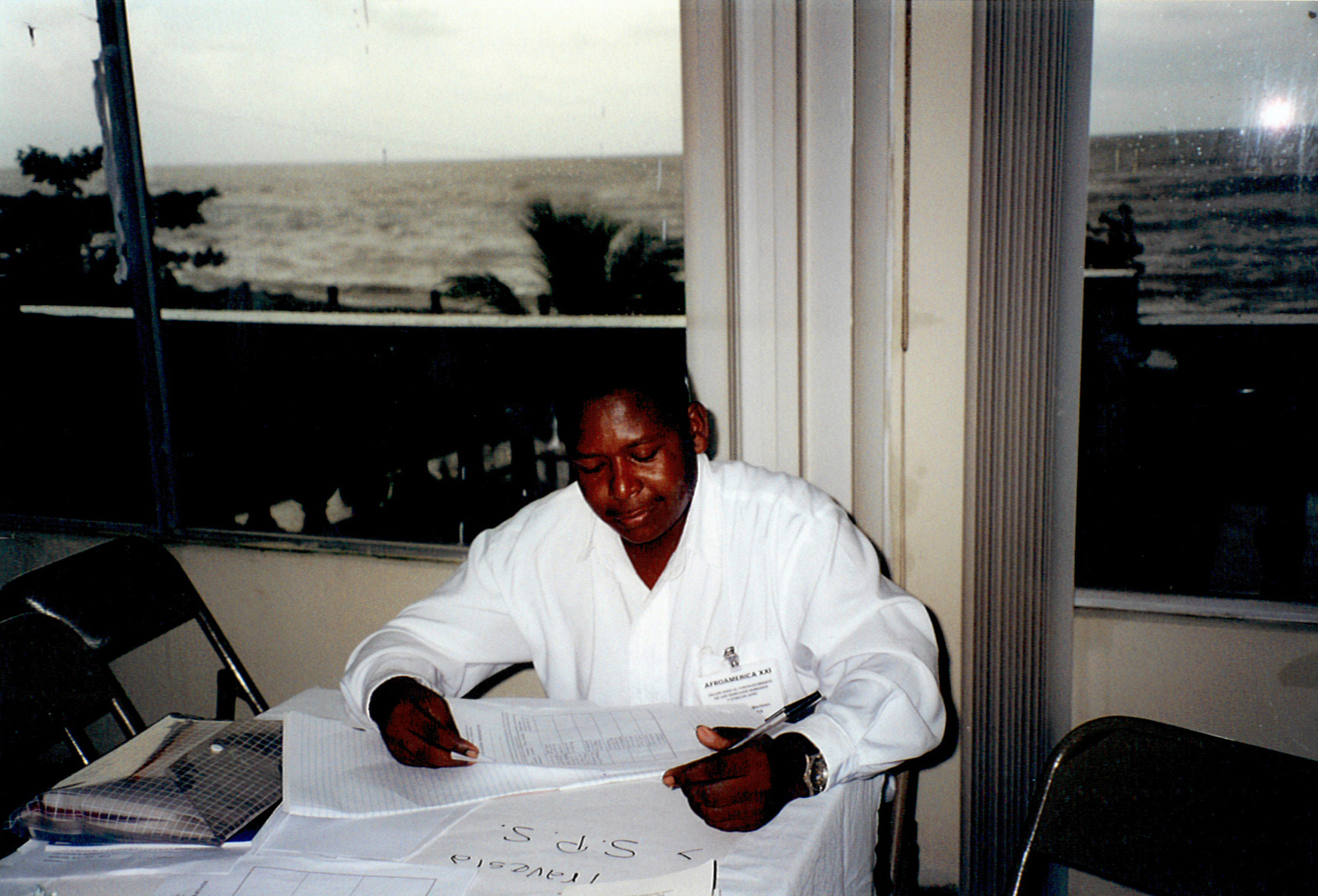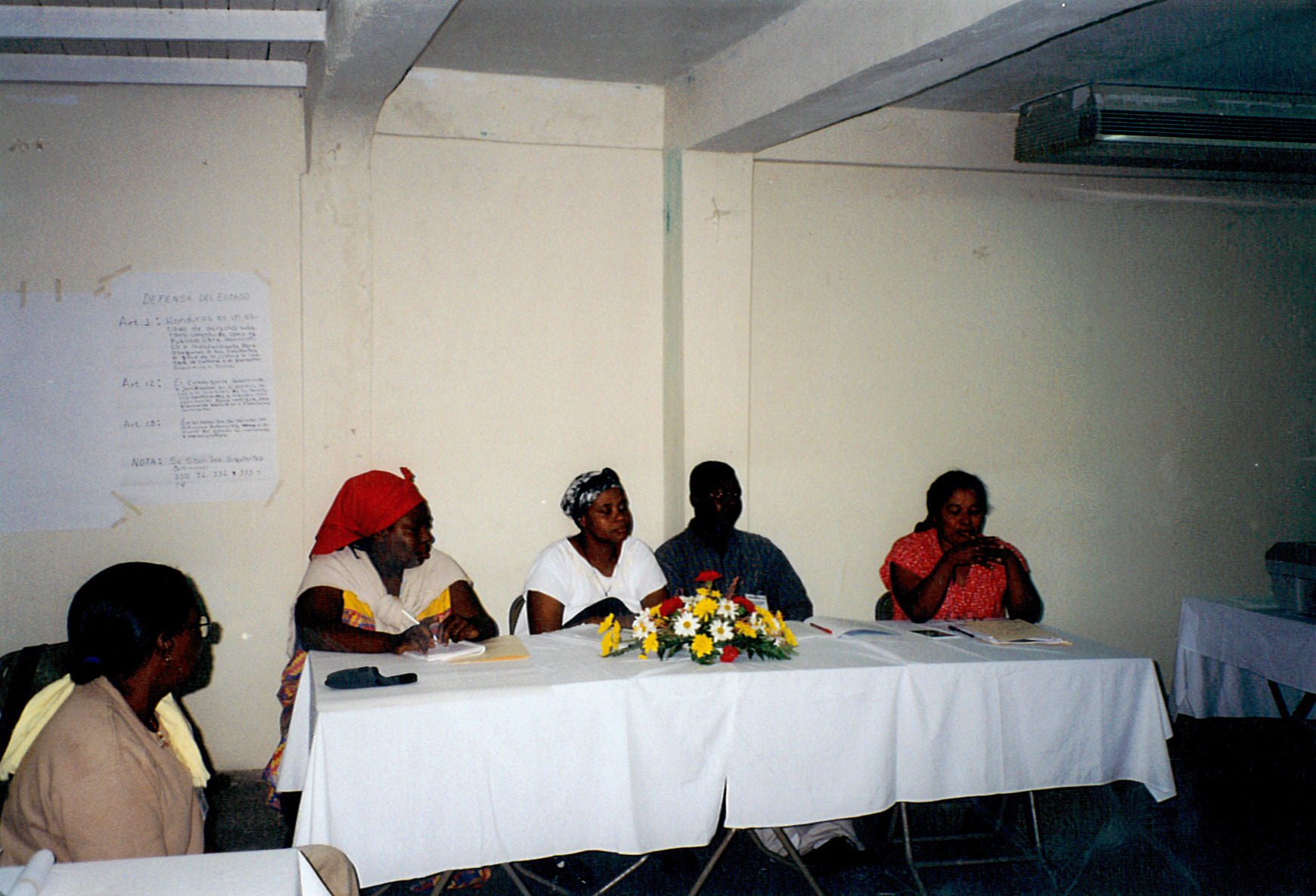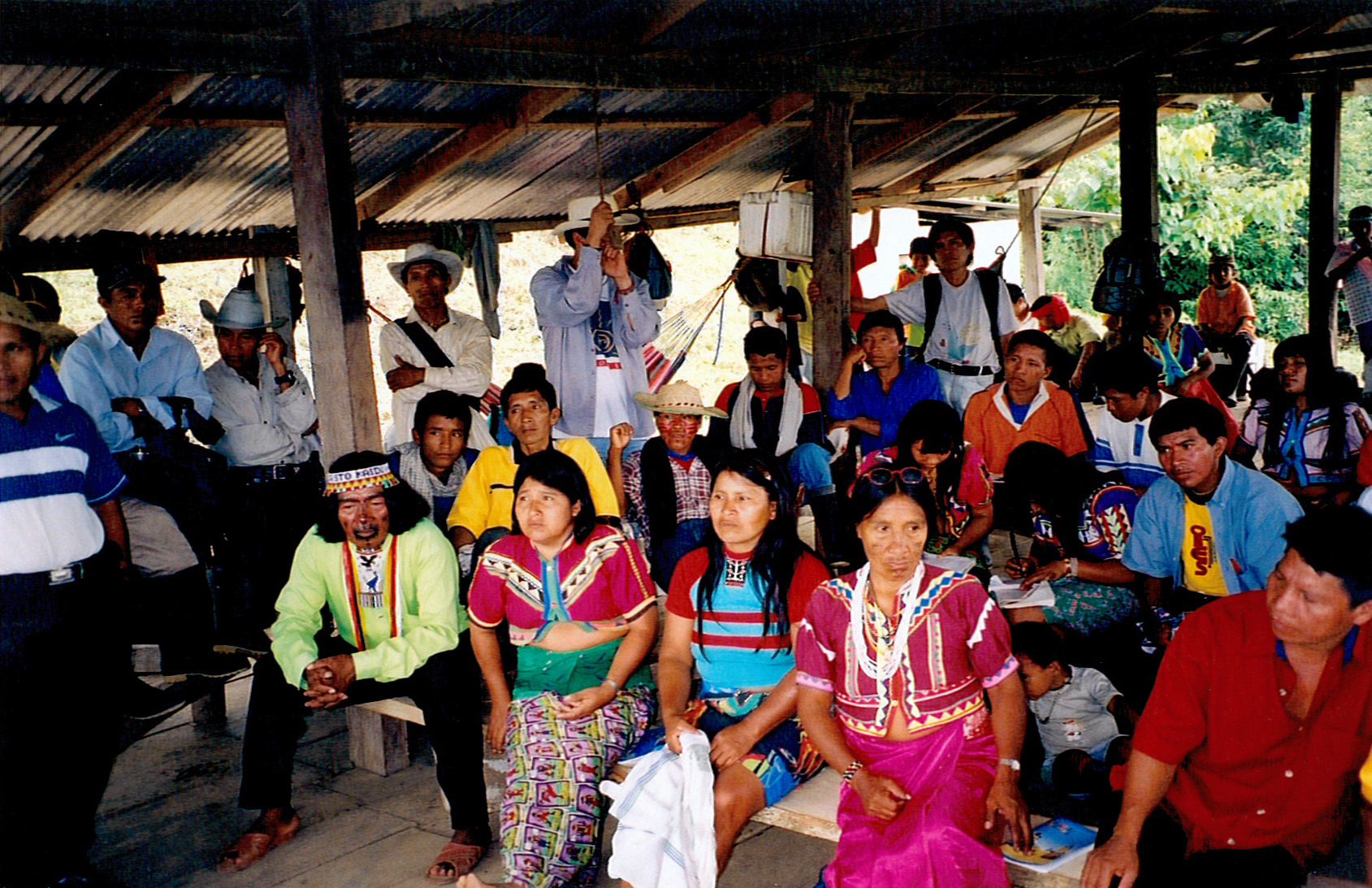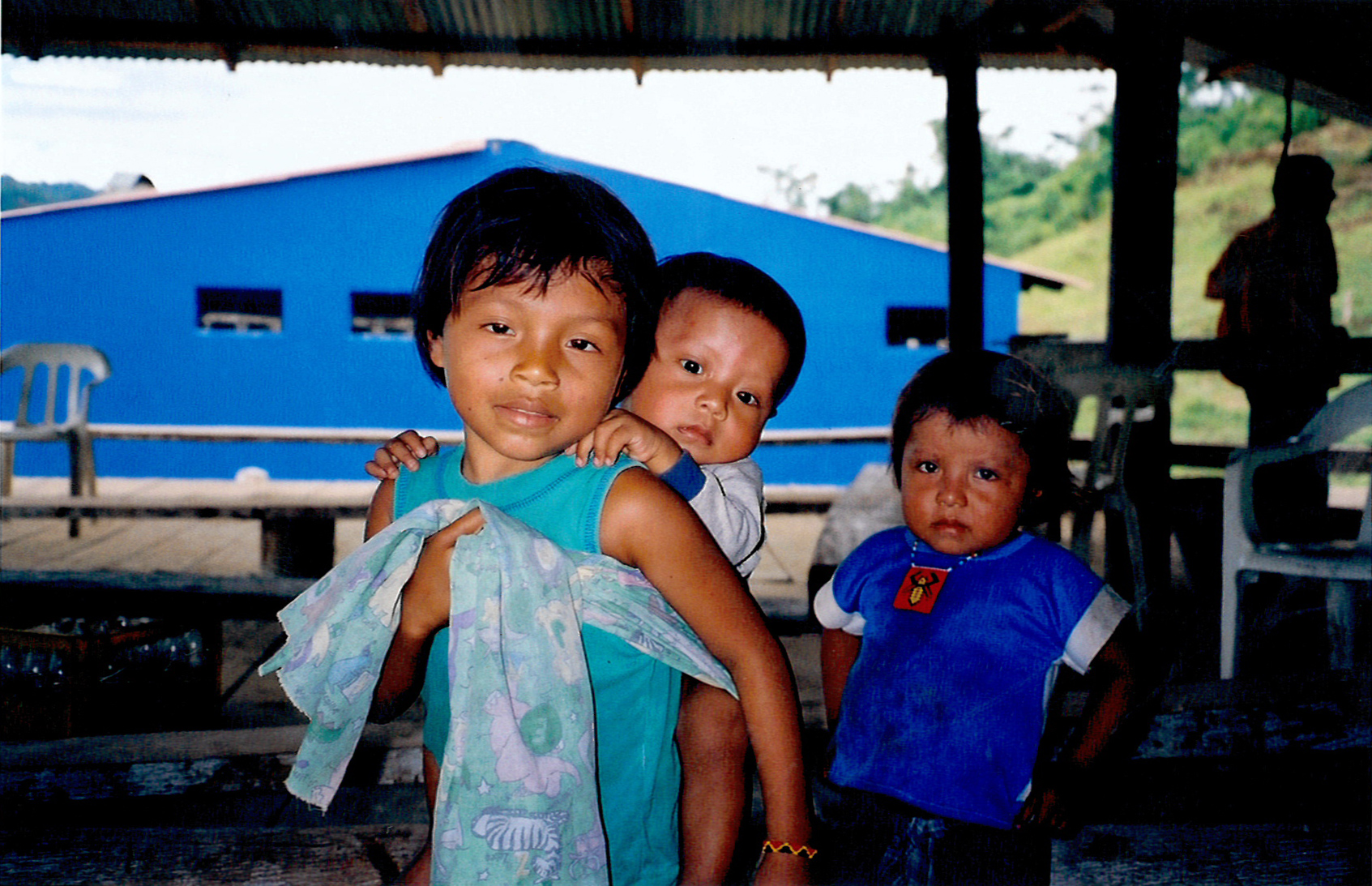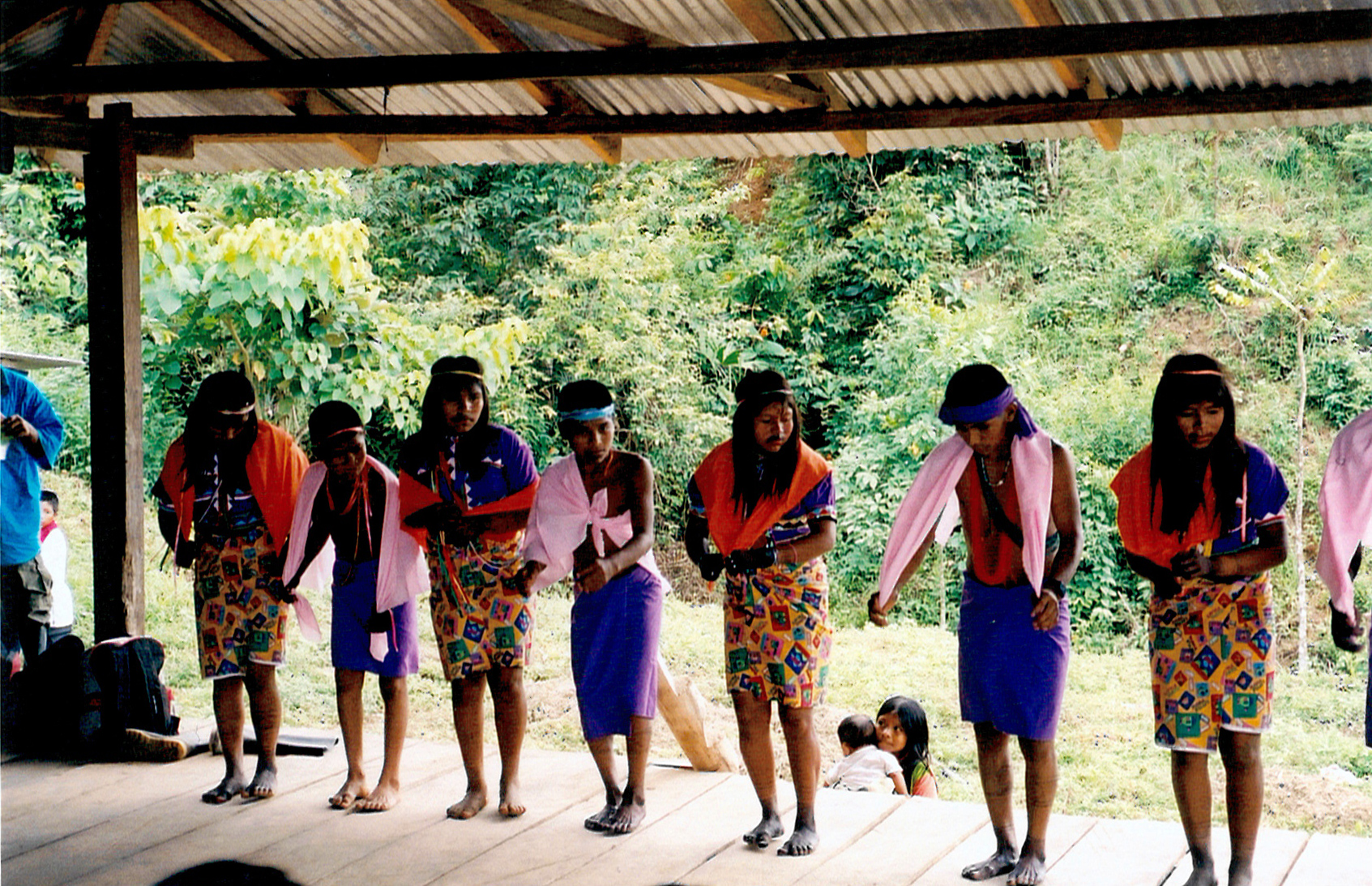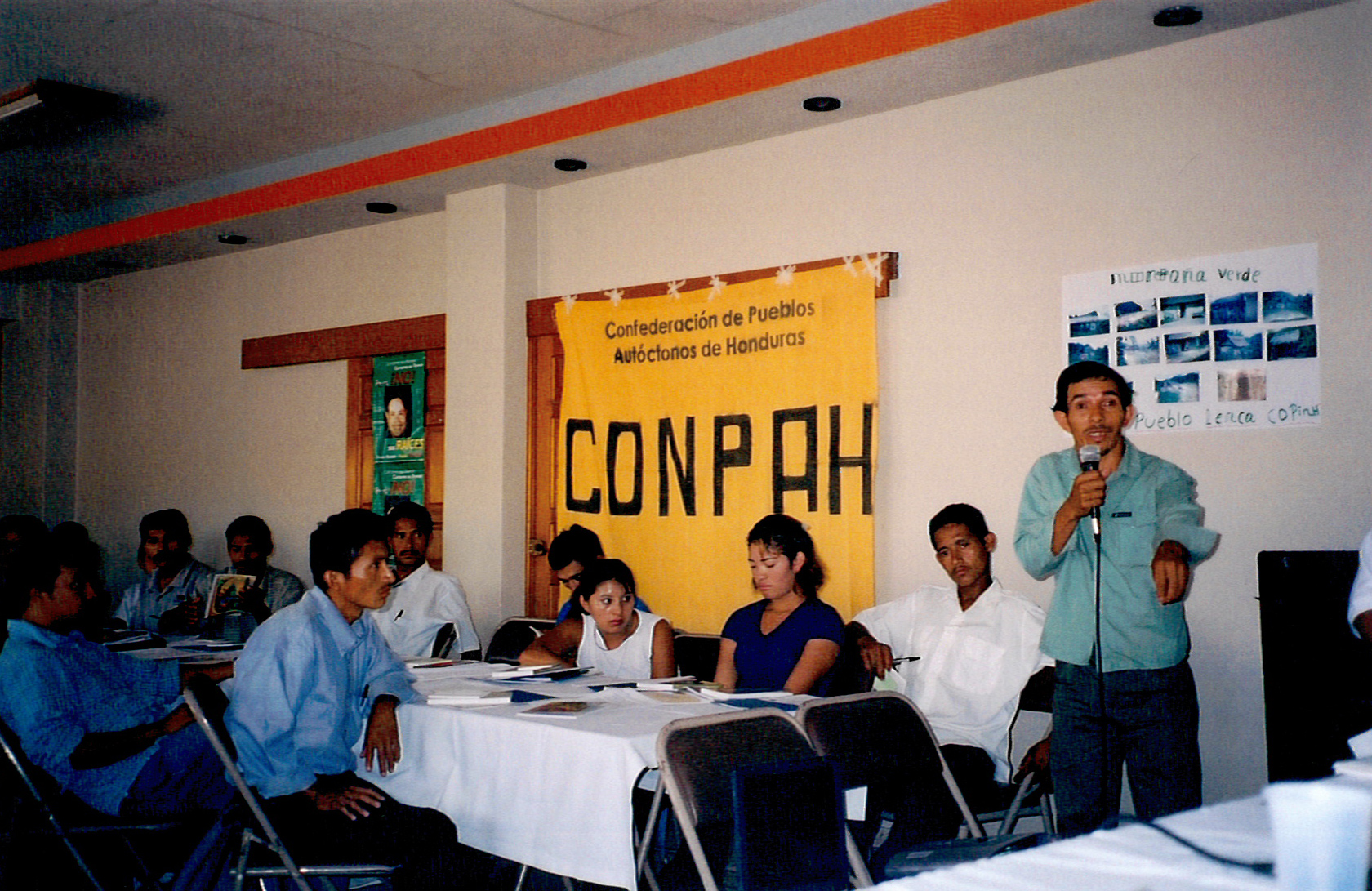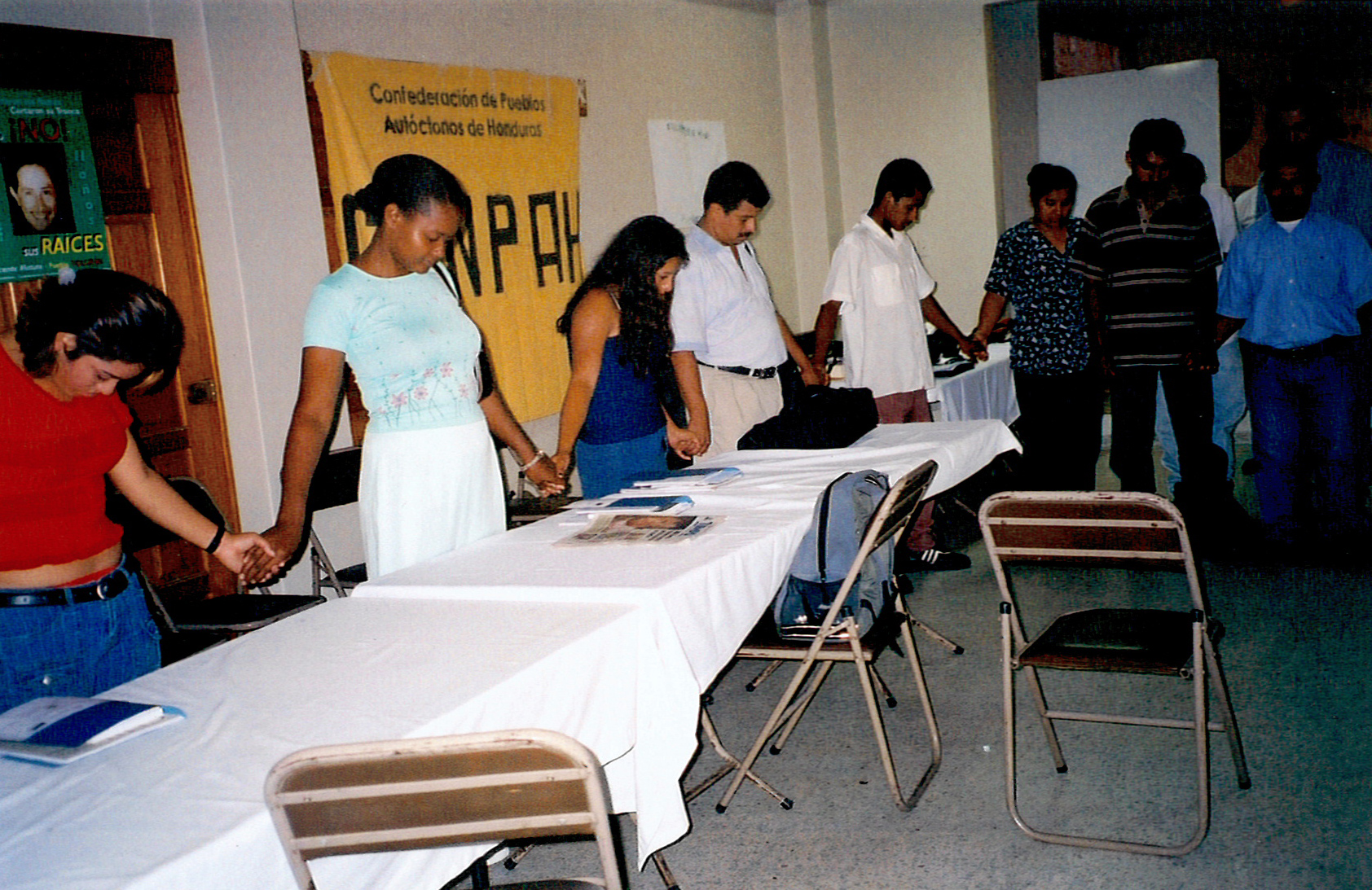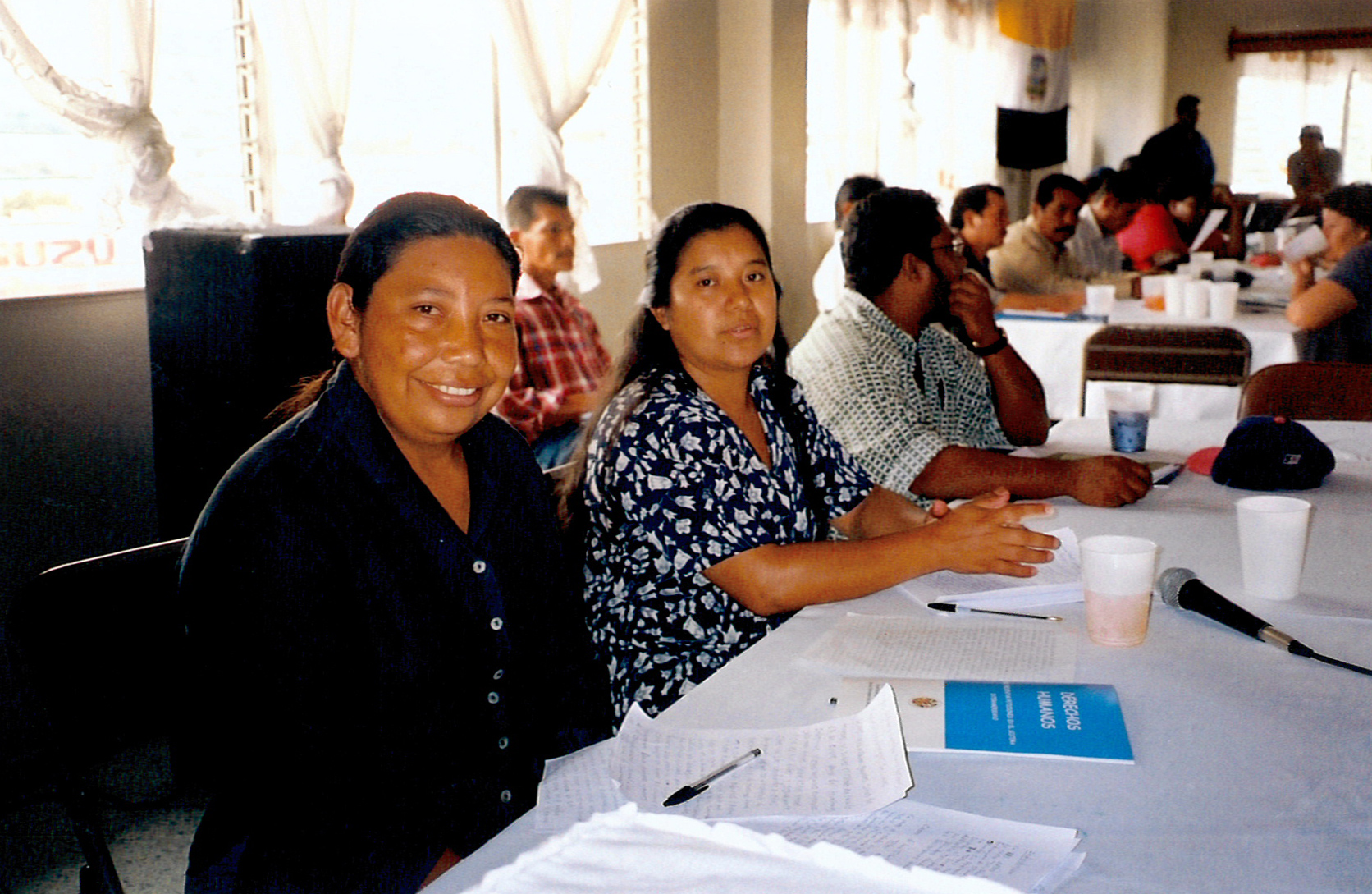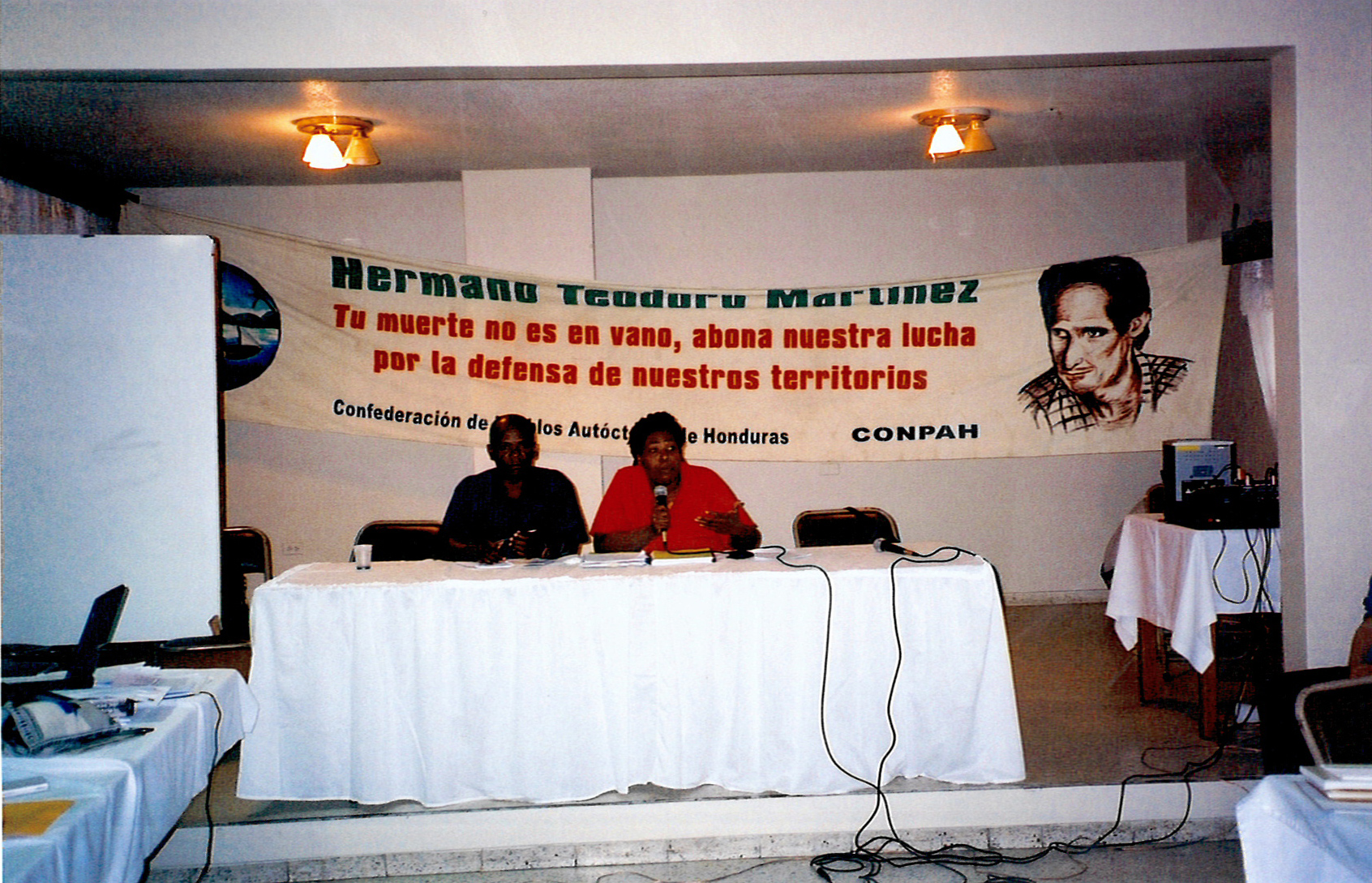- English
- Español
Promotion and Other Activities
2017
The Special Rapporteur of the United Nations on the Rights of Indigenous Peoples, Victoria Tauli-Corpuz and the former Rapporteur on the Rights of Indigenous Peoples of the Inter-American Commission on Human Rights, Francisco Eguiguren jointly publish summary of meeting
Peru, June 8 and 9, 2017
The joint document (available here - only in Spanish) presents the main conclusions and recommendations of the "Working Meeting on norms of international law on the human rights of indigenous peoples in voluntary isolation and in initial contact in the Amazon and the Gran Chaco: review and proposals for action". This working meeting took place on June 8 and 9, 2017 in Lima, Peru and was jointly organized by the Office for South America of the United Nations High Commissioner for Human Rights (OACNUDH), the International Working Group on Indigenous Affairs (IWGIA), the Special Rapporteur of the United Nations on the Rights of Indigenous Peoples, Victoria Tauli-Corpuz ("Special Rapporteur") and the former Rapporteur on the Rights of Indigenous Peoples of the Inter-American Commission on Human Rights (IACHR), Francisco Eguiguren.
The main objective of the working meeting was to identify progress, good practices, major challenges, potential gaps and emerging issues that should be considered in relation to the implementation of the Guidelines and the IACHR Report. It concludes with a series of general recommendations regarding issues in which States and the different relevant actors of the countries of the region should redouble their efforts, and to which international human rights organizations and the international community should also give particular attention.
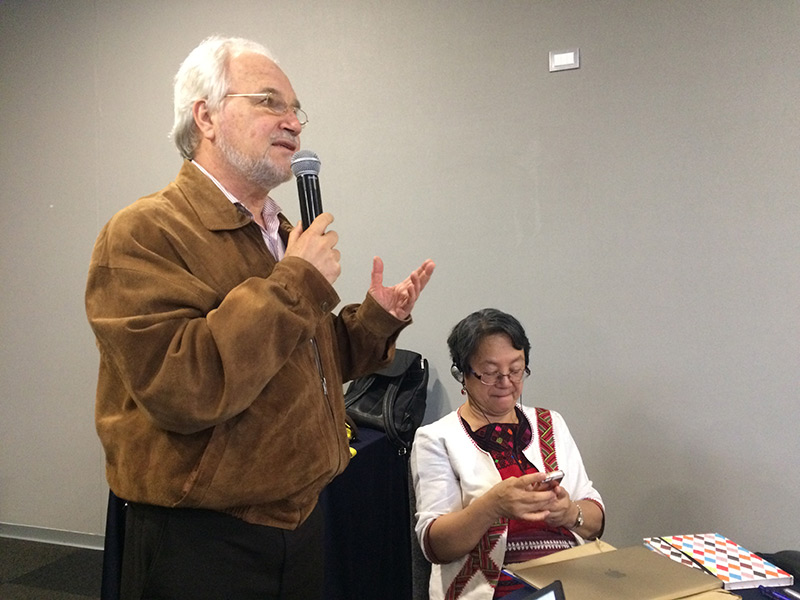


2014
Lima, Peru: Forum on International Responsibility of Countries in which Mining Companies are Based
On April 21, Rapporteur Rose-Marie Belle Antoine participated in a forum on the international responsibility of the countries in which mining companies are based. The event, organized by Red Muqui, enabled her to receive information on the impact of mining on indigenous peoples.
United States: IACHR Headquarters: Meeting of Organizations with Rapporteur on Rights of Indigenous Peoples
On March 26, Rapporteur Rose-Marie Belle Antoine met with representatives of indigenous peoples and organizations, as well as representatives of civil society organizations from different countries of the Americas, during the 150th session of the IACHR, held at the Commission’s headquarters in Washington. At the meeting, the Rapporteur was able to share information about key concerns involving the situation of indigenous peoples in the region with indigenous leaders and civil society representatives from Argentina, Brazil, Chile, Ecuador, Guatemala, Honduras, Paraguay, Panama, Peru, and Suriname.
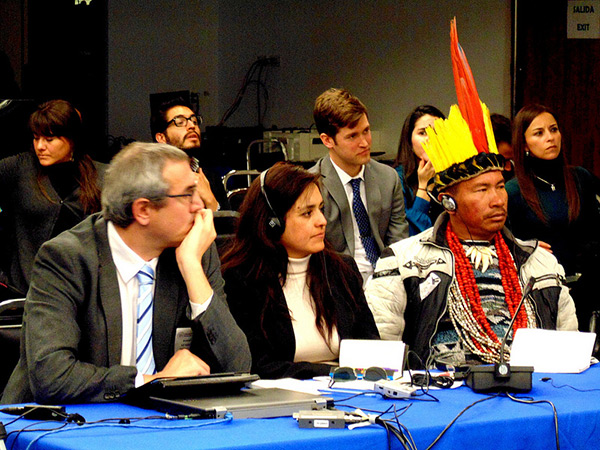
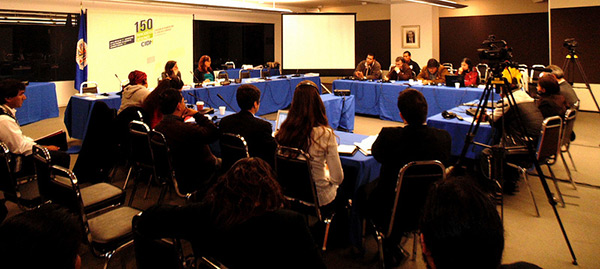
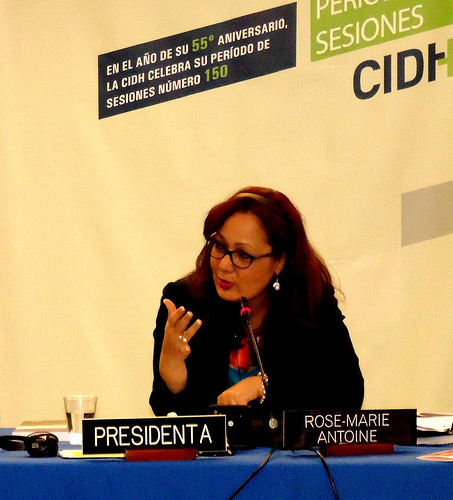
2013
Nairobi, Kenya: Forum on Compliance with Decision by African Commission on Human and Peoples’ Rights
On September 23, a specialist from the Executive Secretariat took part in a meeting in Nairobi, Kenya, organized by the African Commission on Human and Peoples’ Rights, which was attended by members of the African Commission, the United Nations Special Rapporteur on the Rights of Indigenous Peoples, civil society organizations, and representatives of the State of Kenya. The purpose of the meeting was to discuss the implementation status of a final report on the merits issued by the African Commission, which found that the Kenyan State had violated the rights of the members of the Endorois indigenous people protected under the African Charter on Human and Peoples’ Rights. The meeting was held under the auspices of the International Work Group for Indigenous Affairs (IWGIA), the German Cooperation Agency, the Danish Ministry of Foreign Affairs, and the Endorois Welfare Council.
Lima, Peru: Meeting of Expert Indigenous Women from South America
On November 21 and 22, a "Meeting of Expert Indigenous Women from South America" was held in Lima, Peru, in which indigenous leaders from Argentina, Bolivia, Brazil, Chile, Colombia, Ecuador, Uruguay, Venezuela, and Suriname participated. , Paraguay and Peru. The participants spoke with Commissioner Tracy Robinson about the situation of indigenous women in the region, information that will be used in the referred regional report on indigenous women that the IACHR is preparing.
South Africa: Advanced Course on the Rights of Indigenous Peoples
On September 17, a specialist from the Executive Secretariat participated in a course called “Rights of Indigenous Peoples,” held September 16-20, 2013, at the University of Pretoria, South Africa. The IACHR attorney taught a class on “The rights of indigenous peoples in the inter-American human rights system.” The course had more than 40 participants, some of whom were members of indigenous peoples, especially from English-speaking African countries, with work-related connections to States, nongovernmental organizations, and national human rights commissions.
Guatemala: Dialogue on the Rights of Indigenous Women in the Inter-American System
On On August 20, a dialogue was held in Guatemala City on the rights of indigenous women in the inter-American system. Speakers included indigenous women from Panama, Mexico, Costa Rica, and Guatemala, who shared their views and experiences on the protection mechanisms offered by the inter-American human rights system, particularly where indigenous women are concerned. The women from foreign countries who participated as speakers were Sonia Henríquez, a Guna indigenous woman from Panama who is the director of the National Coordination of Indigenous Women of Panama (CONAMUIP); Guadalupe Martínez Pérez, a Nahua indigenous woman from Mexico who belongs to the Alliance of Indigenous Women of Central America and Mexico; and Elides Rivera, a Teribe indigenous woman from Costa Rica who is a member of that country’s National Forum of Indigenous Women. The Guatemalan presenters included Manuela Alvarado and a representative of the Office of the Ombudsperson for Indigenous Women.
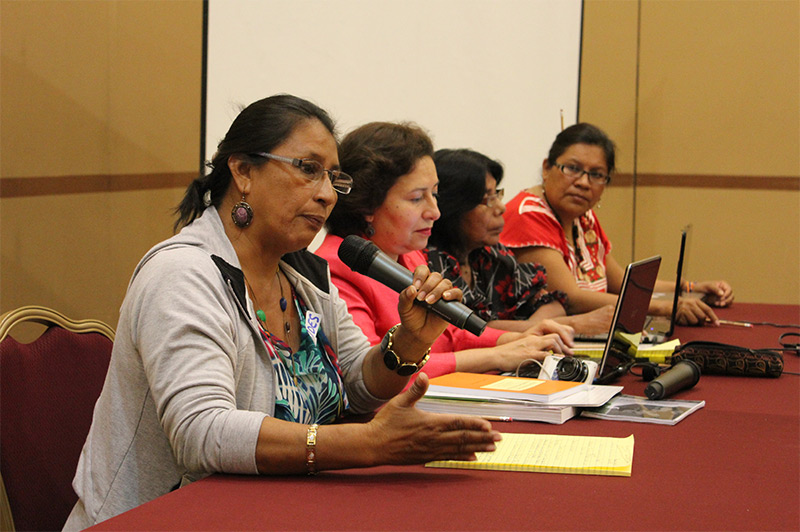
Guatemala: Meeting of Indigenous Women Experts from Central America and Mexico
On August 19-20, the Office of the Rapporteur organized a “Meeting of Indigenous Women Experts from Central America and Mexico” in Guatemala City, which included the participation of 15 indigenous women from Costa Rica, El Salvador, Guatemala, Honduras, Nicaragua, Panama, and Mexico. The event was part of a consultation and information-gathering process the IACHR is carrying out to prepare a regional report on the situation of indigenous women in the Americas. The purpose of the report will be to analyze the multiple forms of discrimination and violence that affect indigenous women in the exercise of their rights.
New York, United States: Dialogue of Rapporteur Dinah Shelton with indigenous women
On May 22, Rapporteur Dinah Shelton participated in an informal dialogue with indigenous women from different countries of the continent as part of the preparation of the regional thematic report on the situation of indigenous women in the Americas. The Rapporteur had the opportunity to share information with indigenous women from countries such as Argentina, Bolivia, Brazil, Canada, Colombia, Ecuador, Guatemala, Honduras, Mexico, and Uruguay.
Lima, Peru: Meeting of South American Women Indigenous Experts
A “Meeting of South American Women Indigenous Experts” was held in Lima, Peru, on November 21-22, with the participation of indigenous women leaders from Argentina, Bolivia, Brazil, Chile, Colombia, Ecuador, Uruguay, Venezuela, Suriname, Paraguay, and Peru. The participants discussed the situation of indigenous women in the region with Commissioner Tracy Robinson. The information that came out of the discussion will go into the regional report on indigenous women being prepared by the IACHR.
United States: Headquarters: Meeting of Experts on Indigenous Peoples in Voluntary Isolation and Initial Contact
On May 6, 2013, a workshop was held in Washington, D.C., on Indigenous Peoples in Voluntary Isolation and Initial Contact, as part of the preparation of a thematic report on their situation. The workshop included the participation of four experts on the subject from Brazil, Ecuador, Peru, and Paraguay, and it was moderated by Rapporteur Shelton.
Buenos Aires and Jujuy, Argentina: Meeting on Ethnic and Gender Discrimination in the Americas
On April 8 and 9, the Coordinator of the Rapporteurship participated in a meeting organized by the Council of Aboriginal Organizations of Jujuy (COAJ), in collaboration with Femmes Autochtones du Québec, which is part of the project “Ethnic and gender discrimination in Americas: the case of indigenous women ”. On the occasion, representatives of the COAJ and of Lawyers and Lawyers for Justice and Human Rights (AJDH), Service of the Mixe people (SER), National Indigenous Organization of Colombia (ONIC), Femmes autochtones du Québec, among others attended. Likewise, on April 7, she gave a class on the Inter-American System in Jujuy for indigenous leaders and young university students.
Banjul, The Gambia: Conference on Regional Systems and Indigenous Peoples' Rights
On April 7 and 8, 2013, the Deputy Executive Secretary of the IACHR, Elizabeth Abi-Mershed, participated in a conference-workshop on approaches, advances, and perspectives of the different human rights systems on the rights of indigenous peoples in the Headquarters of the African Commission on Human and Peoples' Rights in Banjul, Gambia. The activity was convened by the African Commission, and the Indigenous Peoples Working Commission and organized by the International Working Group on Indigenous Affairs (IWGIA). Among others, the UN Special Rapporteur on the Rights of Indigenous Peoples, James Anaya, and the UN Minority Rapporteur Gay McDougall. Elizabeth Abi-Mershed presented the work of the IACHR on the rights of indigenous peoples, as well as on the jurisprudence of the inter-American human rights system on the matter.
Gambia: Conference on Regional Systems and Rights of Indigenous Peoples
Gambia, April 7 and 8, 2013
On April 7 and 8, 2013 the Deputy Executive Secretary of the IACHR, Elizabeth Abi-Mershed, participated in a conference-workshop on approaches, progress and prospects of the different human rights systems on the rights of indigenous peoples in the headquarters of the African Commission on Human and Peoples' Rights in Banjul, Gambia. The event was organized by the African Commission and the Working Committee on Indigenous Peoples, organized by the International Work Group for Indigenous Affairs (IWGIA). Among the attendants were the UN Special Rapporteur on the Rights of Indigenous Peoples, Mr. James Anaya, and UN Minority Rapporteur, Mr. Gay McDougall. Elizabeth Abi-Mershed spoke about the work of the Commission on the rights of indigenous peoples, as well as the jurisprudence of the human rights system in the field.
San Salvador. El Salvador: "Gender, Cultural Diversity and Human Rights in the field of Health".
On February 26, 2013, the coordinator of the Rapporteurship on the Rights of Indigenous Peoples made a presentation on the rights of indigenous peoples in the inter-American human rights system in relation to cultural diversity and health, in the course “ Gender, Cultural Diversity and Human Rights in the field of Health ”, organized by the Office of Gender, Diversity and Human Rights of the Pan American Health Organization. The course was aimed at “strengthening the capacities of PAHO / WHO staff and the Member States for gender mainstreaming, cultural diversity, and the application of human rights standards and instruments in the formulation, implementation, monitoring, and evaluation of health policies, programs, and legislation ”.
2012
United States: OAS Briefing Program for the US Department of State International Visitor Leadership Program
On October 25, 2012, the coordinator of the Rapporteurship on the Rights of Indigenous Peoples gave a presentation on the rights of indigenous peoples and afro-descendants, as part of a program created by the OAS for the “OAS Briefing Program for the US Department of State International Visitor Leadership Program”. The presentation was attended by representatives of Latin American Indigenous and Afro-descendants groups.
United States: OAS Briefing Program for the US Department of State International Visitor Leadership Program
Washington, D.C., October 2012
On October 25, 2012, the coordinator of the Rapporteurship on the Rights of Indigenous Peoples gave a presentation on the rights of indigenous peoples and afro-descendants, as part of a program created by the OAS for the "OAS Briefing Program for the US Department of State International Visitor Leadership Program". The presentation was attended by representatives of Latin American Indigenous and Afro-descendants groups.
First Forum of Indigenous Authorities and the Government of Colombia
On October 6, 2012, the Rapporteurship participated in the First Forum of Indigenous Authorities and the Government of Colombia , which was organized by ONIC in Bogota, with the collaboration of the Presidential Council on Gender Equality, the Colombian Institute of the Family Wellbeing, and UNFPA. It had as its main objectives to promote joint actions to eradicate practices which violate the rights of indigenous women pertinent to their health and personal integrity. The event had the participation of indigenous authorities; various entities from the Colombian state; UNFPA and UNDP, among other international organizations.
South Africa: Advanced Course on the Rights of Indigenous Peoples
On September 12, 2012, a specialist of the Executive Secretariat took part in the Course "Rights Rights of Indigenous Peoples," in the University of Pretoria, South Africa, that took place September 10-14, 2012. The course was financed by the International Work Group for Indigenous Affairs (IWGIA), the International Labor Organization (ILO), the Human Rights Center of the University of Pretoria, and the Ministry of Spain for Foreign Affairs and Cooperation. In the oportunity, the IACHR lawyer presented a class on "The Inter-American System on Human Rights and the Rights of Indigenous Peoples." More than 40 people participated in the course, some of them members of indigenous peoples, mainly from English-speaking African countries, and with working links to the States, non governmental organizations and national human rights commissions.
Mexico: Course on the Rights of Indigenous Peoples in the Inter-American System
On July 10, 2012, the Office of the Rapporteur took part in the Course on the Rights of Indigenous Peoples in the Inter-American System, which was organized by the OAS Department of International Law in Mexico City. The event was attended by 40 people, including indigenous representatives and government officials who work on these matters from Costa Rica, El Salvador, Guatemala, Honduras, Nicaragua, Panama, and Mexico.
Course for Indigenous Women and Leaders in Costa Rica
From June 28th to July 1st, 2012, the Rapporteurship participated in a course on the Inter-American System oriented towards indigenous women in Boruca, Costa Rica. It was organized by Forest Peoples Program and had the participation of approximately 20 women and leaders who are members of the Indigenous Women’s Biodiversity Network. The participants stressed the need for the Commission to undertake a regional project to examine closely the main advances and challenges faced by indigenous women in the region and to publish a regional thematic report related to this issue.

United States: Litigating Indigenous Rights in the Americas
On May 24, 2012, the coordinator of the Rapporteurship, Isabel Madariaga, moderated the Discussion Panel "Litigating Indigenous Rights in the Americas." Among the participants were Jorge Calderon, from the Inter-American Court; the National Vice Chief Dwight Dorey, of the Congress of Aboriginal Peoples; Christine Halvorson, of the Rainforest Foundation; Fergus MacKay, of the Forest Peoples Program; and Andrew Miller, of Amazon Watch. The panel took place at American University Washington College of Law.
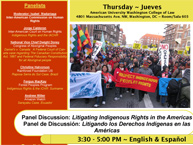
Bolivia: International Mechanisms for Protection of the Rights of Indigenous Peoples
On April 20, 2012, a specialist attorney from the IACHR attended a forum titled, "International Mechanisms for Protecting the Rights of Indigenous Peoples: Strategies and Paths," which was held in La Paz, Bolivia. The event was organized by UN Women for female leaders and authorities belonging to the National Women's Confederation of Bolivia (CNAMIB) and the National Council of Ayllus and Markas of the Qullasuyo (CONAMAQ). At the event, which drew more than 40 participants, the lawyer led a workshop on inter-American standards on indigenous peoples' rights.
Guatemala: Training Workshop for Indigenous Leaders in Mesoamerica
On March 10, 2012 a training workshop was held for indigenous leaders in Mesoamerica with the aim of informing them about the inter-American human rights system, its organs, instruments, and protection mechanisms; as well as to raise awareness about the main aspects of the case law of the organs of the inter-American system where the rights of indigenous peoples' are concerned.
2011
Peru: Workshop on Rights of Indigenous Peoples in the Inter-American System
On November 17 and 18, 2011, the Office of the Rapporteur took part in the "Workshop on Rights of Indigenous Peoples in the Inter-American System," which targeted indigenous leaders and government officials who work on those issues. The workshop was held in the Lima, Peru and organized by the OAS Department of International Law. The event was attended by indigenous representatives from Argentina, Bolivia, Chile, Colombia, Ecuador, Peru, Paraguay, and Venezuela.
Paraguay: Seminar on Rights of Indigenous Peoples
On September 27, the Office of the Rapporteur took part in an international seminar on "Property and Ownership Rights of Indigenous Peoples in the Context of Human Rights," organized by the Office of Human Rights of the Supreme Court of Justice of Paraguay in Asunción.
Peru: Promotion workshops in Cusco and Tarapoto
From September 23 to 27, at the invitation of Instituto de Defensa Legal in Peru, the Office of the Rapporteur took part in a series of workshops to promote the report of the IACHR on Indigenous and Tribal Peoples' Rights over their Ancestral Lands and Natural Resources . The workshops were held in Cusco and Tarapoto.
United States: Meeting on generation of specific case-law on indigenous women in the inter-American system
The Office of the Rapporteur took part in a meeting of lawyers as part of a project of the organization Rights & Democracy entitled “Generation of Specific Case-Law on Indigenous Women in the Inter-American System for Protection of Human Rights.” The meeting was held in Washington, D.C. on August 30 and September 1, 2011.
Switzerland: Meeting with the Office of the United Nations High Commissioner for Human Rights
In the context of an academic visit to Geneva on July 6 and 7, 2011, Rapporteur Shelton held meetings with different operational areas of the Office of the United Nations High Commissioner for Human Rights, including the section responsible for indigenous peoples and minorities.
United States: United Nations Permanent Forum on Indigenous Issues
On May 16, Rapporteur Shelton took part in the tenth meeting of the United Nations Permanent Forum on Indigenous Issues.
United States: Coordination meeting with the United Nations Special Rapporteur on Indigenous Peoples
On May 5, 2011, Rapporteur Shelton traveled to Tucson, Arizona for a meeting with the United Nations Special Rapporteur on Indigenous Peoples, James Anaya, in order to coordinate the working agendas of the two rapporteurs' offices and discuss other matters of common interest.
Mexico: Seminar on Case-Law of the Inter-American Court
On March 10, 2011, the Office of the Rapporteur gave a presentation at a seminar on the case-law of the Inter-American Court of Human Rights, organized by Universidad Nacional Autónoma de México in Mexico City.
United States: Presentation of a thematic report
The Office of the Rapporteur held an event to launch the IACHR report, Indigenous and Tribal Peoples' Rights over Their Ancestral Lands and Natural Resources at the University of Oklahoma. It was agreed at that time that the University's Law School should publish the full report in a special issue of the American Indian Law Review.
2010
Panama: Training Workshop in Ngöbe Region
A Human Rights Specialist working with the Rapporteurship spoke at a training workshop held December 3-5, 2010, in the Hato Chamí indigenous community of Panama's Ngöbe-Buglé comarca, or administrative region. The workshop was geared toward leaders, community promoters, and attorneys of the Ngöbe indigenous people.
United States: Symposium at the National Museum of the American Indian
On November 12, 2010, IACHR Executive Secretary Santiago Canton, along with staff of the Office of the Rapporteur on the Rights of Indigenous Peoples, gave a presentation explaining the Commission's work and the territorial rights of indigenous peoples under the inter-American human rights system, at the virtual symposium “Centuries of Change: State of the Native Nations.” The event was jointly organized by the Smithsonian Institution’s National Museum of the American Indian and the OAS, in Washington, D.C.
United States: Training Seminar for Indigenous Leaders
On September 14, 2010, a Human Rights Specialist working with the Rapporteurship participated in a training seminar on "The Rights of Indigenous Peoples in the Inter-American System," organized by the OAS Department of International Law and held in San José, Costa Rica. The event was geared toward indigenous leaders and attorneys from Central America.
United States: Seminar on Mechanisms for the Participation of Indigenous Peoples in the Inter-American System
The IACHR, in conjunction with the OAS Department of International Law, the Summits Secretariat, and the Secretariat for External Relations, helped to organize and carry out a Seminar on Mechanisms for the Participation of Indigenous Peoples in the Inter-American System , which was held June 22-24 at OAS headquarters. More than 60 people attended the event during the three days. Of those, 29 representatives came thanks to OAS funding; they belonged to 27 indigenous organizations from Argentina, Belize, Bolivia, Brazil, Canada, Chile, Costa Rica, Guatemala, Guyana, Honduras, Mexico, Nicaragua, Panama, Paraguay, Peru, Saint Vincent and the Grenadines, Trinidad and Tobago, United States, and Uruguay.
The event included workshops and presentations on tools within the inter-American system and new projects designed to promote respect for the human rights of the indigenous peoples of the hemisphere. The seminar concluded with a debate among the members of the various participating organizations. The main result was a declaration by the indigenous representatives attending, in which they request that the OAS establish a permanent forum of indigenous peoples.
- List of Participants
- Seminar Program (Only available in Spanish)
- Declaration of the Representatives of Indigenous Peoples in the framework of the Seminar , June 24, 2010
- OAS Press Release on the Seminar
United States: Training Seminar on the Inter-American and International Systems for the Protection of the Rights of Indigenous Peoples
The IACHR Office of the Rapporteur on the Rights of Indigenous Peoples and the UN Special Rapporteur on the Situation of Human Rights and Fundamental Freedoms of Indigenous People gave a training seminar on the inter-American and international systems for the protection of the rights of indigenous peoples, geared toward indigenous leaders, lawyers, and activists from the United States and Canada. The panelists were the IACHR Rapporteur on the Rights of Indigenous Peoples, Dinah Shelton, and the UN Special Rapporteur on the Situation of Human Rights and Fundamental Freedoms of Indigenous People, James Anaya.
Human rights specialists from the IACHR Executive Secretariat and the University of Arizona’s Support Project for the United Nations Special Rapporteur also gave presentations. The purpose of the seminar was to train the indigenous leaders and attorneys in attendance in the systems of individual petitions and in the protection mechanisms offered by the IACHR and the United Nations with respect to the rights of indigenous peoples, with a view toward enhancing recourse to the different systems by North American aboriginal populations.
Participants also had the chance to talk about the progress made and challenges that remain regarding the respect for and guarantee of the human rights of indigenous peoples in their countries.
This seminar was made possible thanks to financial support provided by the government of Denmark, through a project to strengthen the capacity of the Inter-American Human Rights System in the defense of the human rights of the Indigenous Peoples of the Americas.
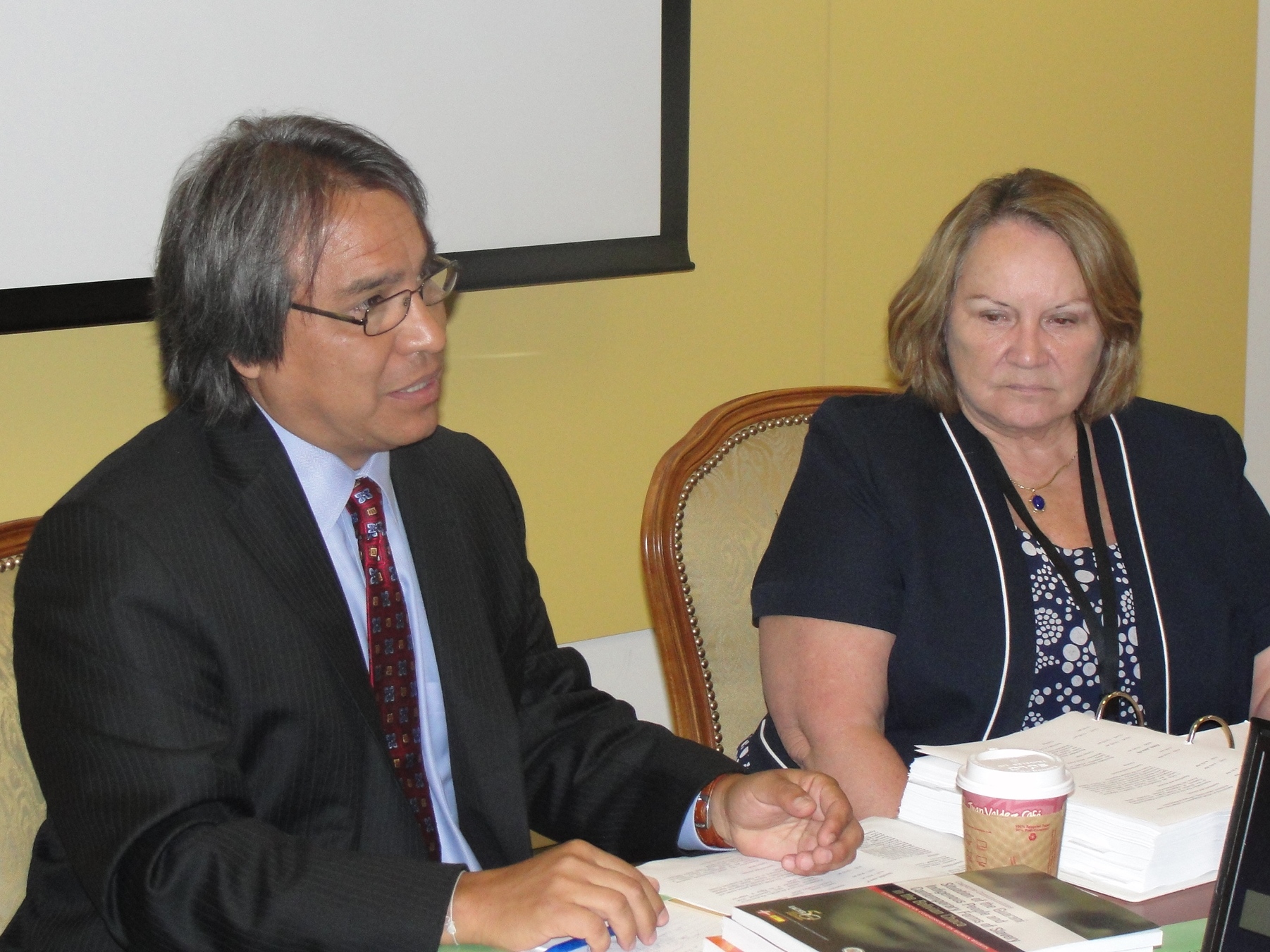
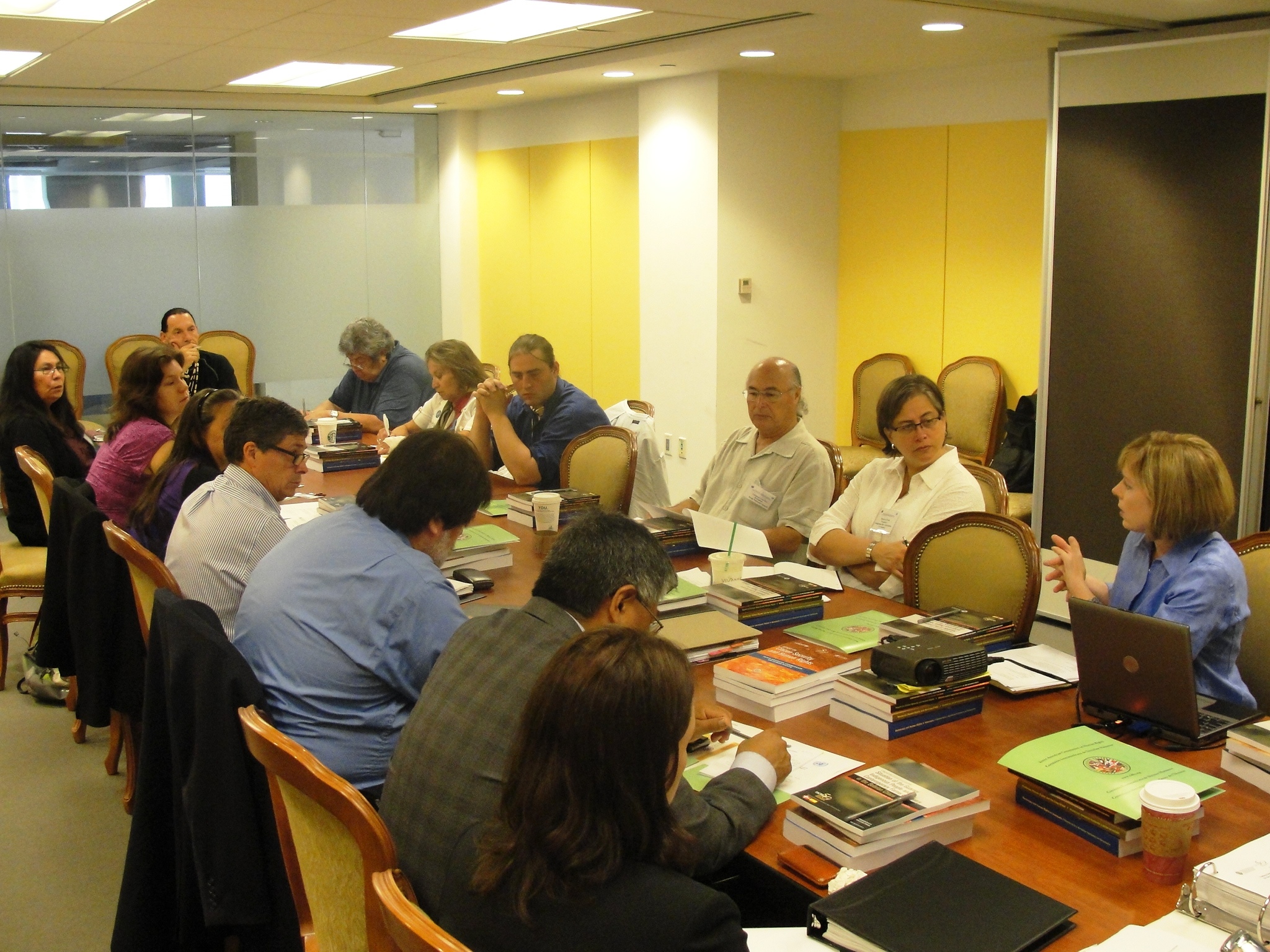
Peru: Seminar on the Inter-American System
On April 14, 2010, attorney Federico Guzmán was a panelist at a forum on "The Rights of Indigenous Peoples in the Inter-American Human Rights System." The event, held in Lima, was geared toward indigenous leaders and defenders of the rights of indigenous peoples in Peru.
2004
Guatemala: Training Workshop for Indigenous Women Leaders
On September 12-18, 2004, the Special Rapporteur on the Rights of Women and Second Vice-Chair of the IACHR, Susana Villarán, visited Guatemala at the invitation of President Oscar Berger and at the request of civil society representatives who were concerned about the number of homicides and the prevalence of other types of violence against Guatemalan women. During the visit, the Office for the Defense of Indigenous Women, in collaboration with the Commission's Offices of the Rapporteur on the Rights of Indigenous Peoples and the Rapporteur on the Rights Women, organized a seminar on the inter-American human rights system, in which 40 indigenous women participated.
The purpose of the visit by the Office of the Rapporteur was to investigate and obtain reliable information about the situation of discrimination and violence against women, and to evaluate the efficacy of policies and institutions dedicated to preventing discrimination and violence, as well as the obstacles for victims and their relatives in obtaining access to justice. In addition, given that Guatemala is a multiethnic and multicultural State, another objective was to investigate the situation of the rights of indigenous women.
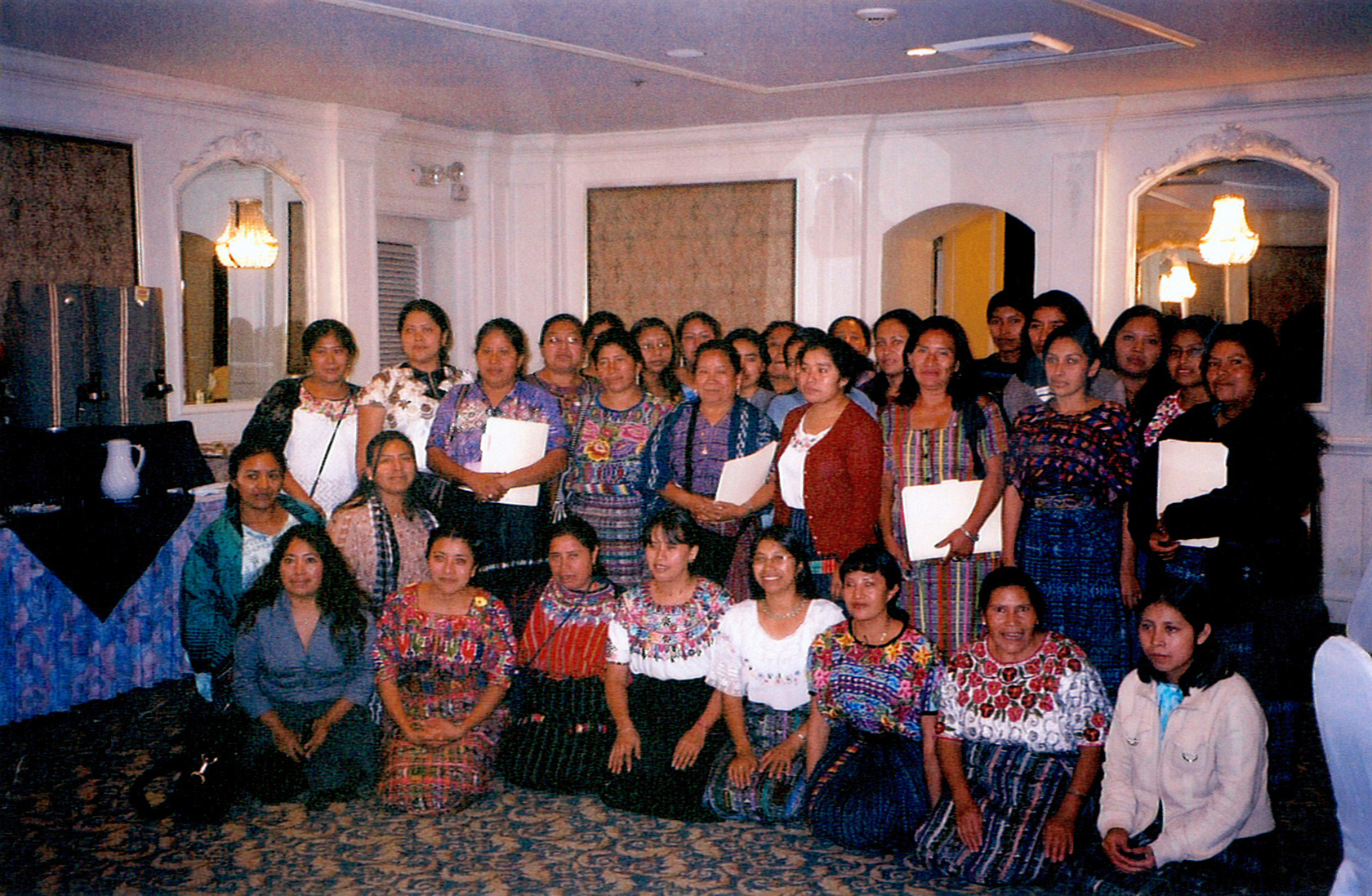
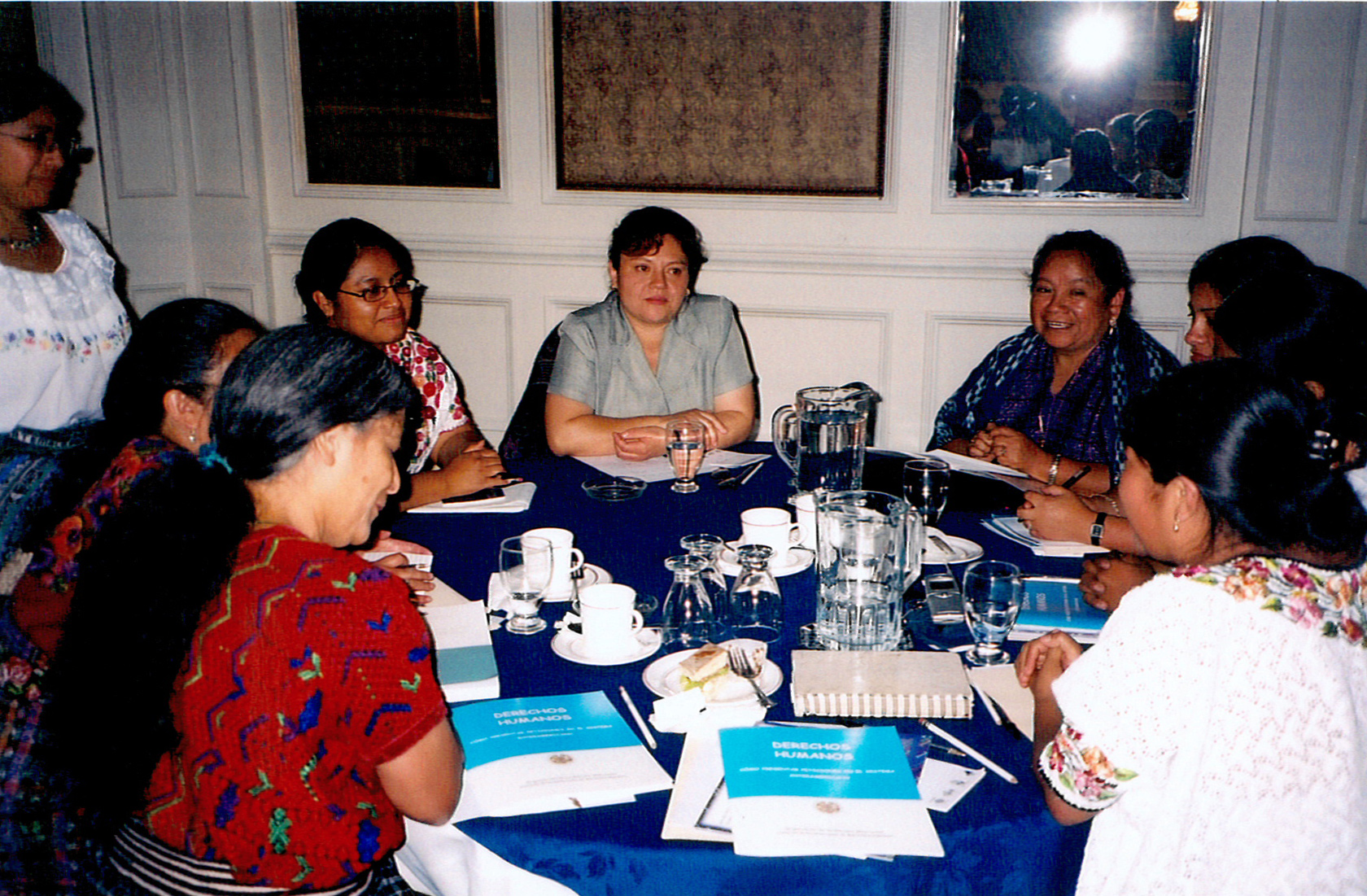
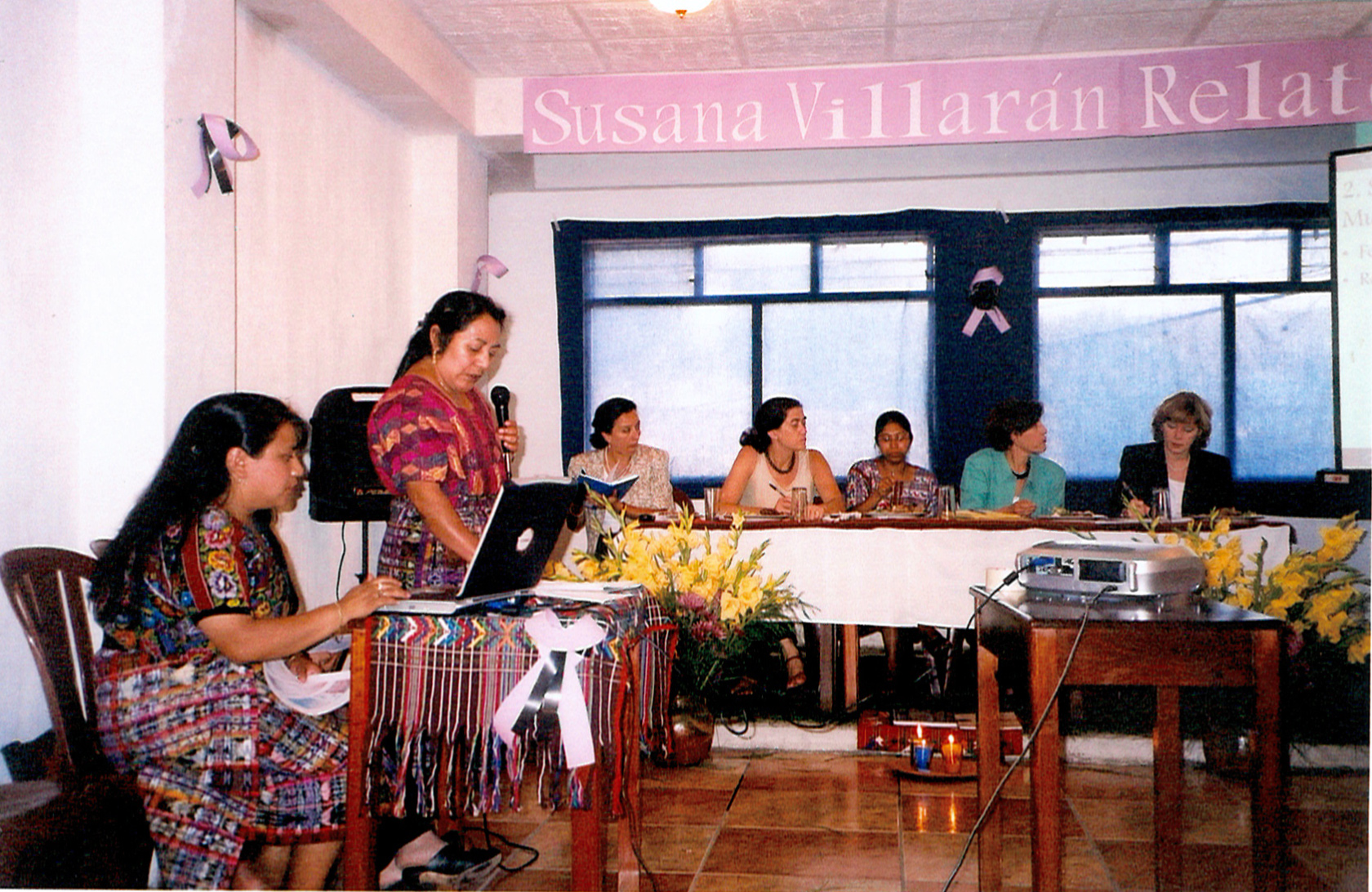
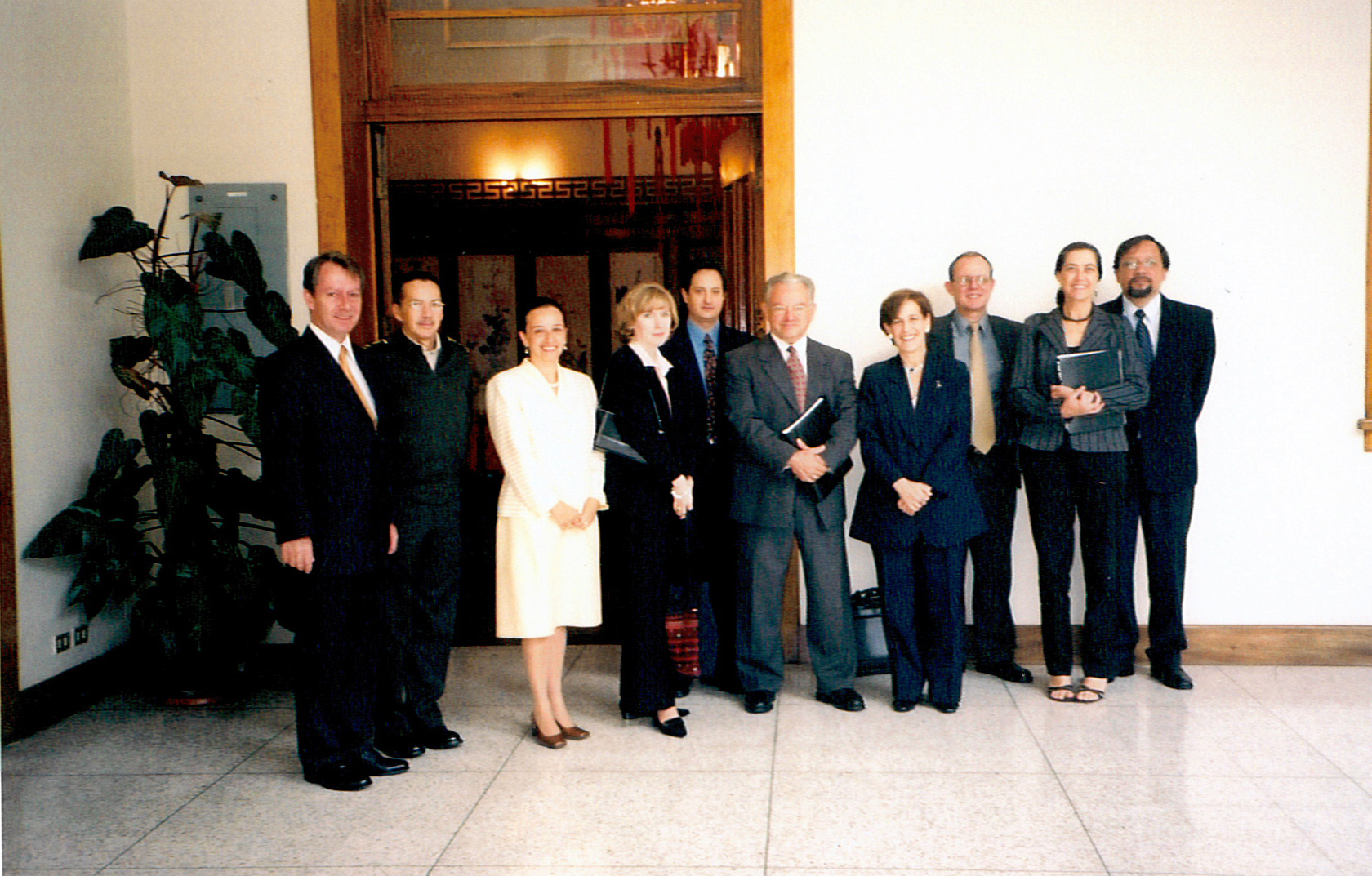
Puerto Lempira, Honduras: Forum on Human Rights for Persons with Disabilities and Indigenous Peoples
From August 30 to September 4, 2004, Isabel Madariaga, the attorney who coordinates the project, along with the attorney who was a fellowship recipient, participated in the Training Workshop on the Human Rights of Persons with Disabilities who Live in the Region of Gracias a Dios, Honduras. This was part of a project to strengthen the inter-American system's capacity to protect the human rights of communities, ethnic minorities, and other vulnerable groups affected by the conflicts in Central America.
This workshop was organized and funded by the Pan American Health Organization (PAHO/WHO), with contributions from the PRODECA Project. Working meetings were also held in Tegucigalpa with health authorities of the State of Honduras. On September 3, a field visit was carried out in Puerto Lempira to interview persons who had disabilities as a result of their work activities, especially former divers who did underwater fishing, most of whom belonged to the Mískito indigenous people.
The workshop included the participation of 40 individuals representing 15 government institutions, international bodies, indigenous organizations, nongovernmental organizations, private institutions, and civil society.

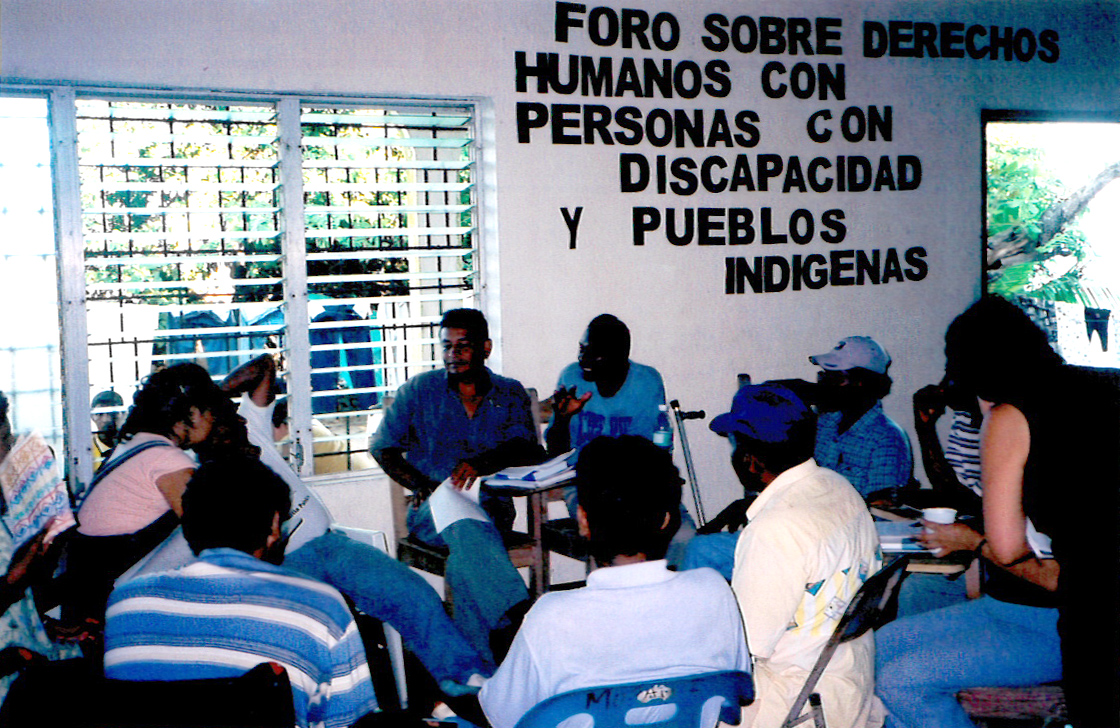
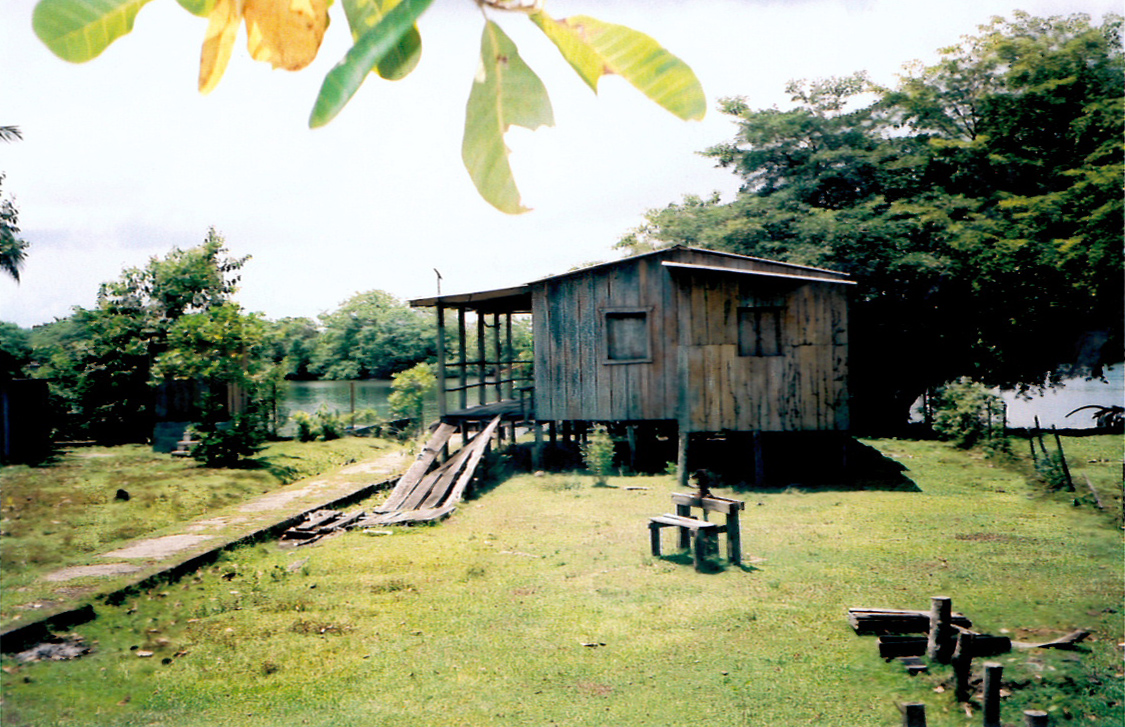
Sololá and Plan de Sánchez, Guatemala
From March 21 to 26, 2004, Commissioner Susana Villarán, IACHR Executive Secretary Santiago Canton, and the Office of the Rapporteur specialist Isabel Madariaga carried out a promotional visit to Guatemala. The purpose of the visit was to present the report Justice and Social Inclusion: Challenges for Democracy in Guatemala (only available in Spanish) which includes a chapter on Rights of Indigenous Peoples. To this end, various meetings were held with members of the three branches of government and different commissions in charge of safeguarding the rights of indigenous men and women.
During this visit, Commissioner Villarán and attorney María Claudia Pulido traveled to the village of Plan de Sánchez to meet with witnesses who would be participating in the hearing held before the Inter-American Court in April 2004.
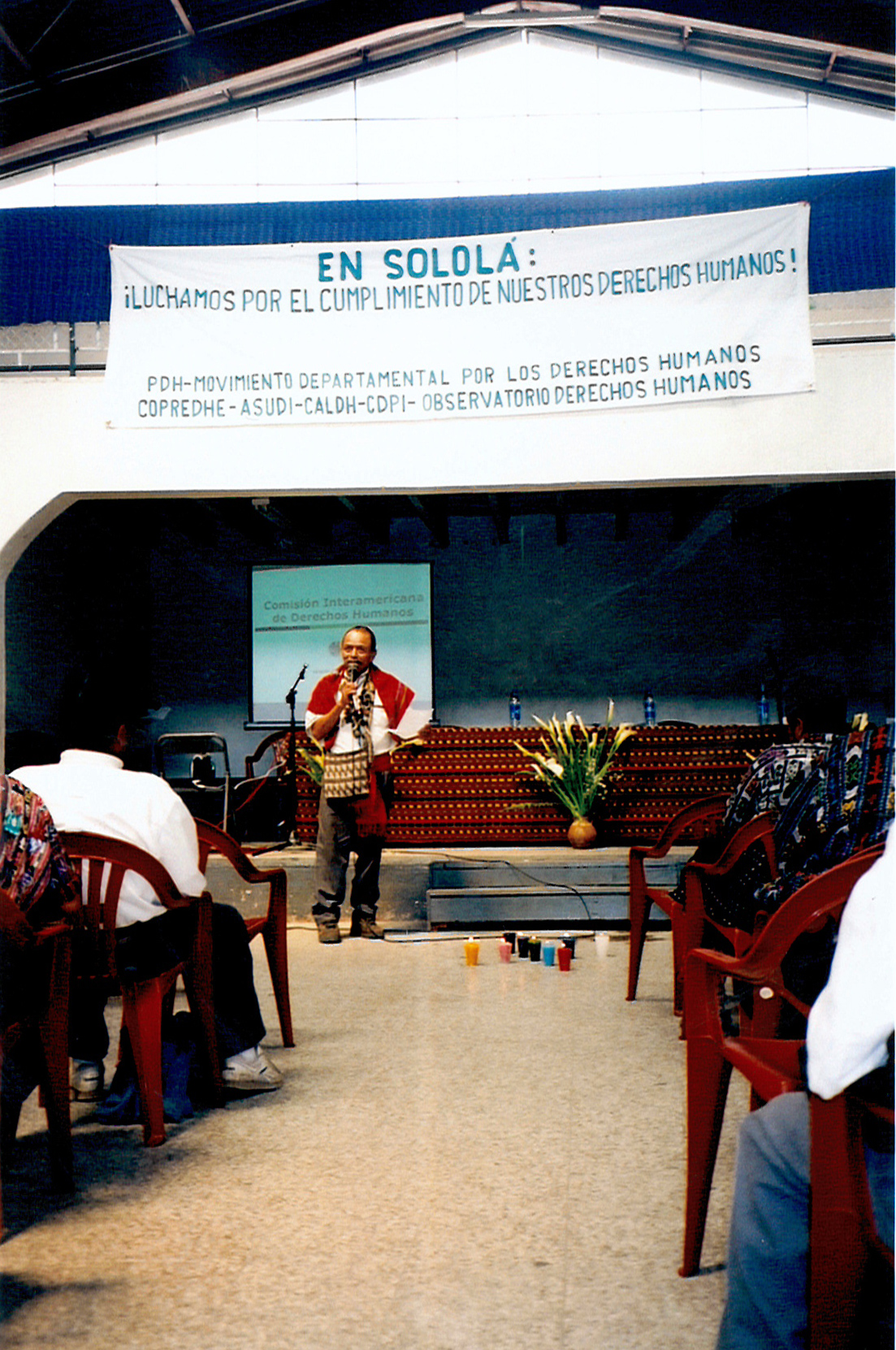

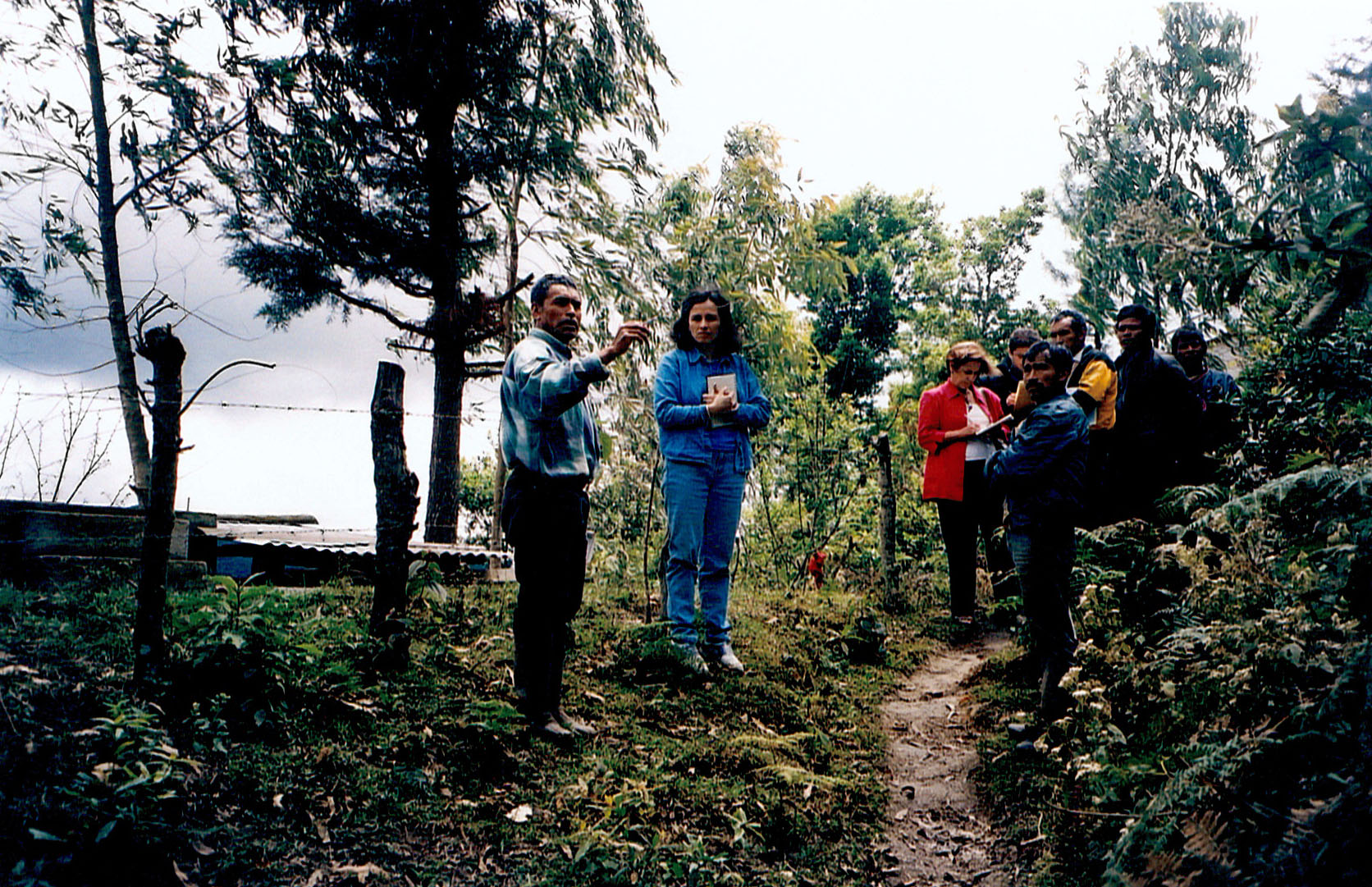
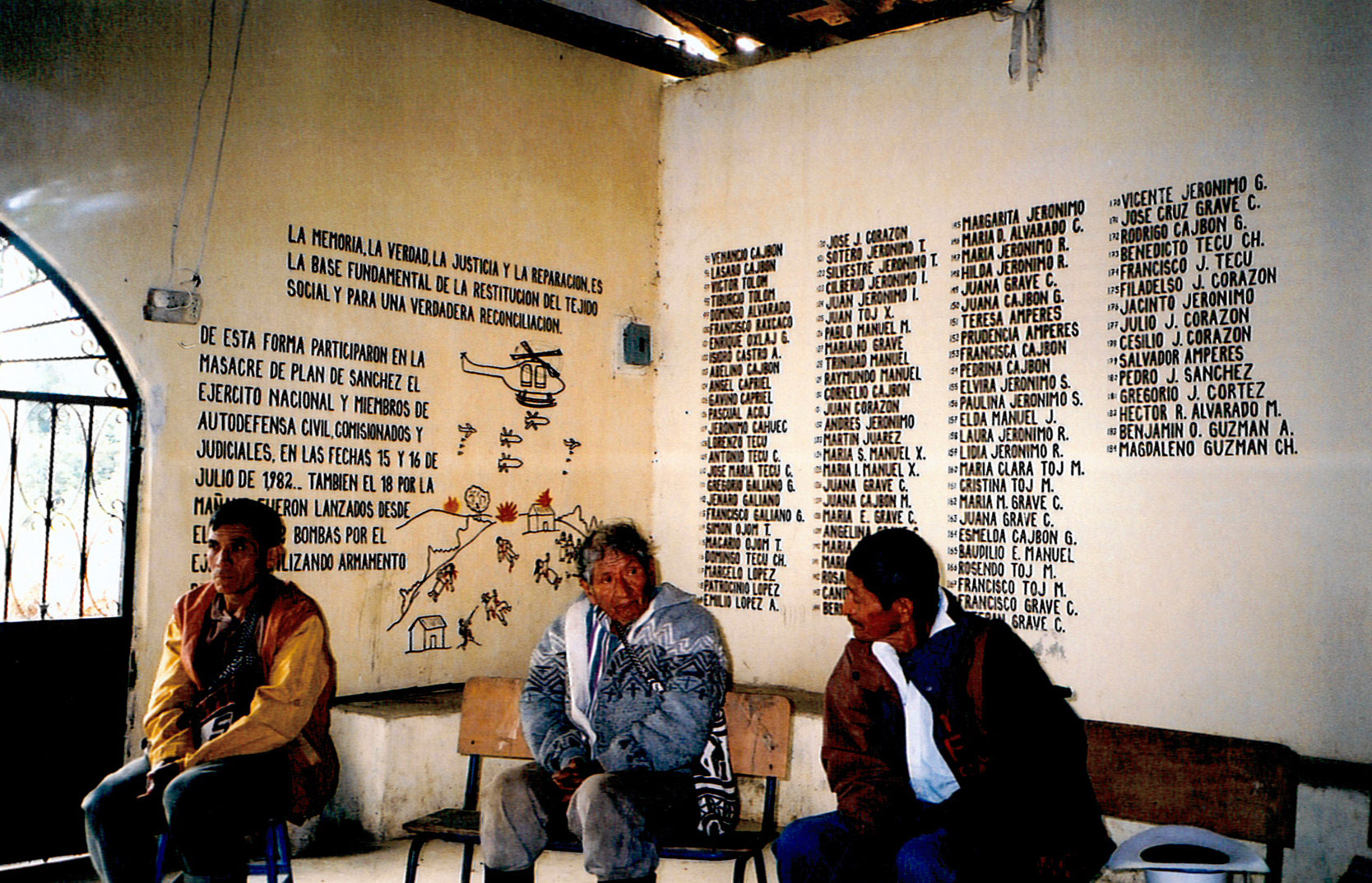
2003
Tulua, Mexico: International Seminar and Practical Workshop on the Administration of Justice and Indigenous Peoples
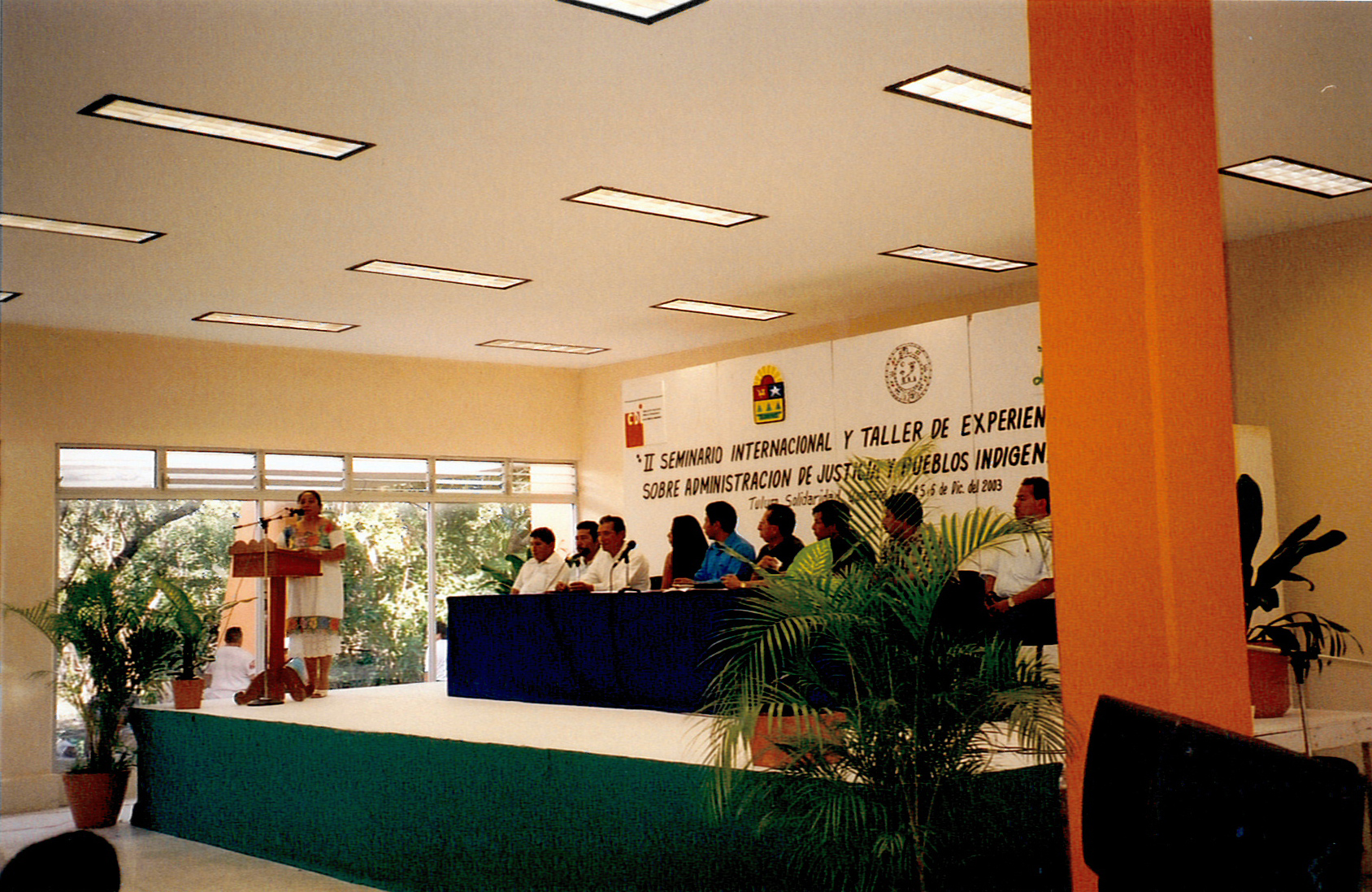

United States: Washington, D.C., March 2003. Course for indigenous lawyers
On March 3, 2003, the IACHR Chair, Marta Altolaguirre, made a presentation in the course for indigenous lawyers of American University’s Indigenous Rights Training Institute.
- Read the presentation (only available in Spanish)
2001
Guatemala: Seminar on the Rights of Indigenous Women in the Inter-American System
The Rapporteur on the Rights of Women, Marta Altolaguirre, and the consultant of the Office of the Rapporteur on the Rights of Indigenous Peoples participated in a Seminar on the Rights of Indigenous Women in the Inter-American System . The purpose of the seminar was to help promote the inter-American system, with special emphasis on the rights of women. Likewise, the event provided the opportunity for both rapporteurships to meet with indigenous women leaders, who shared some of the problems they faced as a result of both gender and ethnicity.
This training seminar included the participation of indigenous women from Guatemala and other Central American Countries (Nicaragua, El Salvador, Costa Rica, Panama). The activity included participation and funding from the project to strengthen the inter-American system's capacity to protect the human rights of communities, ethnic minorities, and other vulnerable groups affected by the conflicts in Central America, in cooperation with Guatemala's Office of the Public Defender for Women's Rights.
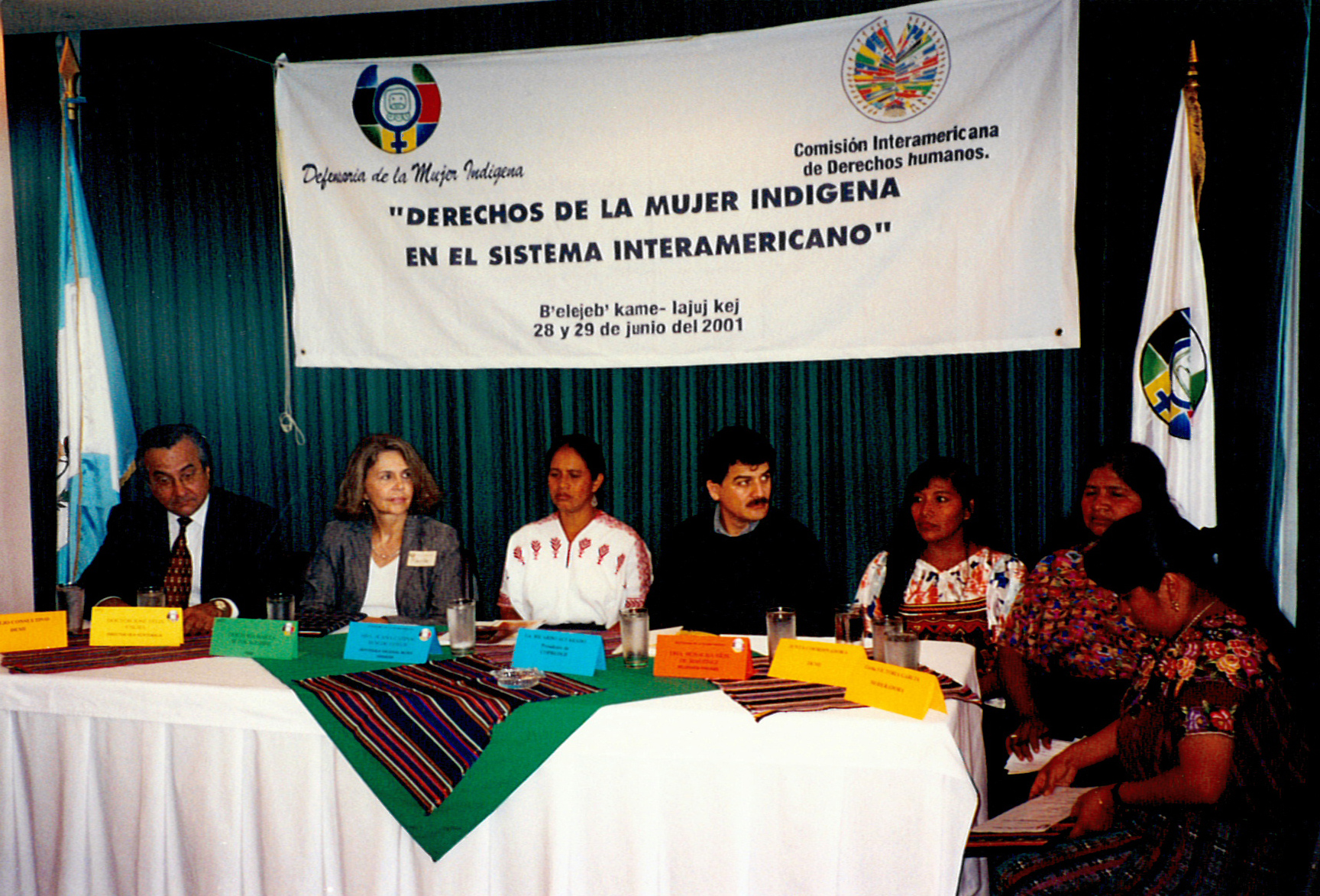
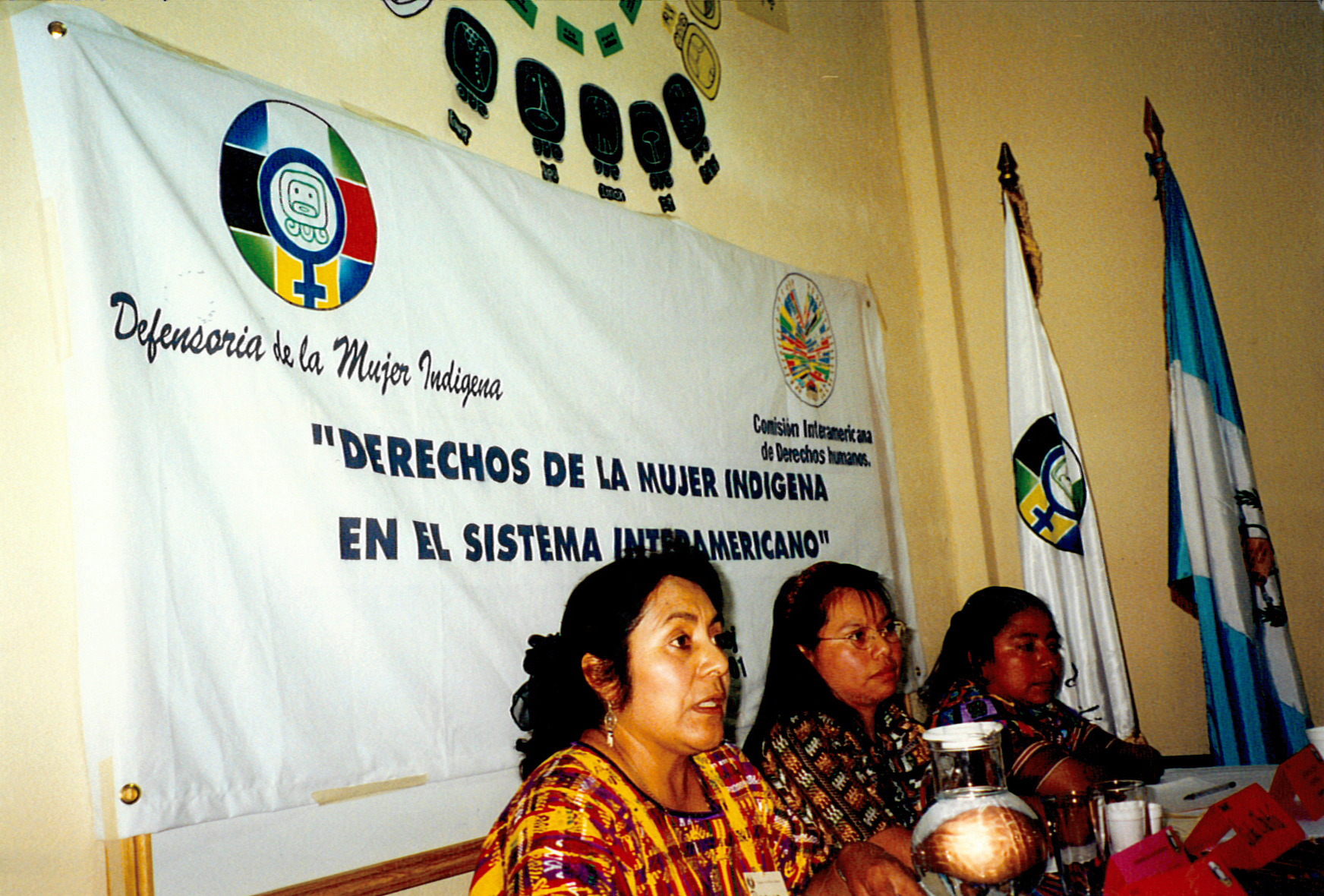
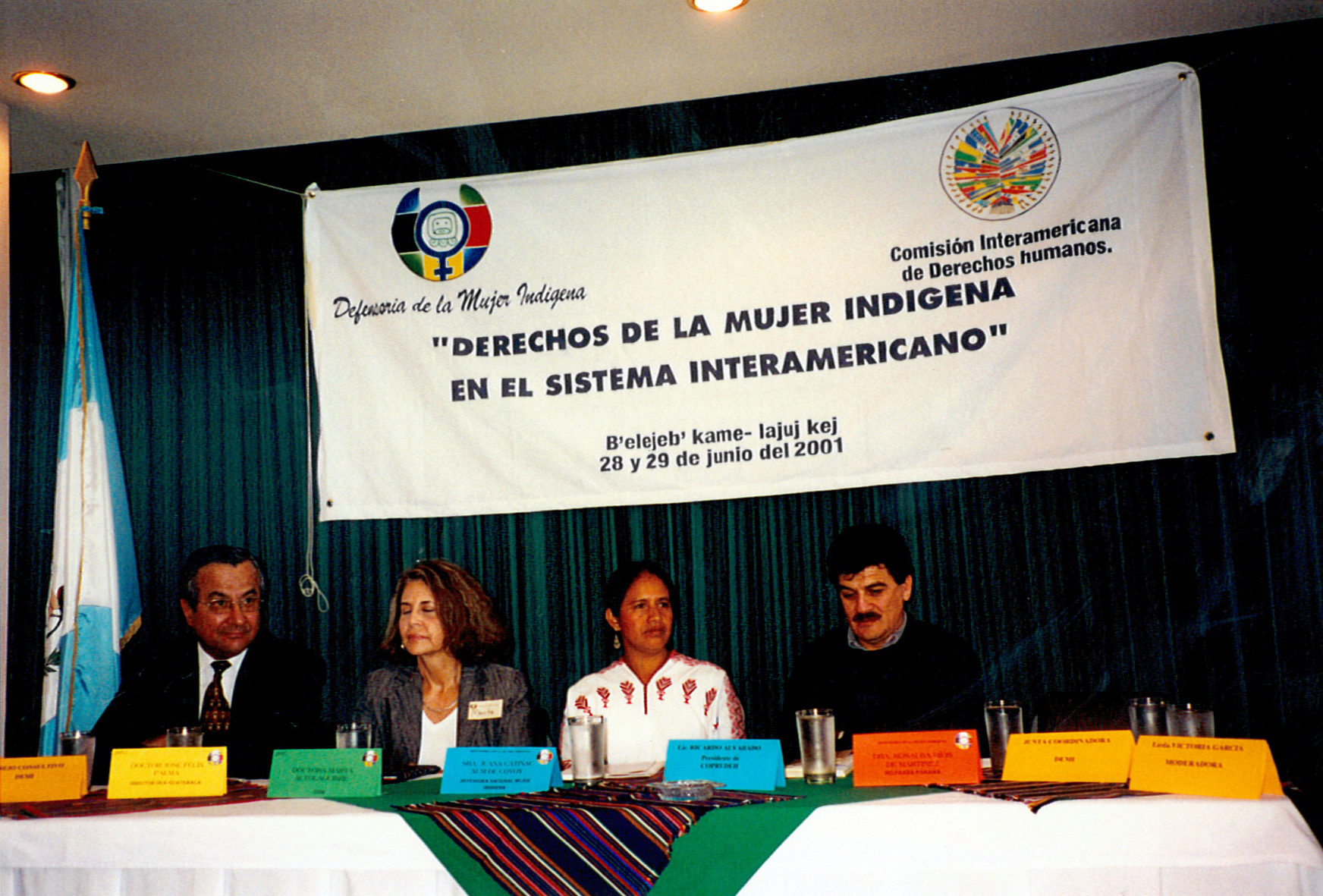
Canada: Ottawa, March 28-31: Indigenous Peoples Summit of the Americas
The Office of the Rapporteur participated as a presenter at the Indigenous Peoples Summit of the Americas, convened by the Assembly of First Nations of Canada. More than 300 indigenous leaders from the Americas attended. The central theme was the draft declarations of the United Nations and the OAS on indigenous populations.
2000
Honduras: Training for Garifuna Leaders, La Ceiba
This meeting of leaders took place to offer human rights training in La Ceiba. The meeting was convened by Afroamérica XXI and OFRANEH. The purpose was to train attorneys and community leaders with a view to creating area committees of monitors, and to provide both domestic and international legal tools to address human rights violations.
